50% travel, 50% charity, 100% meaningful
50% travel, 50% charity, 100% meaningful
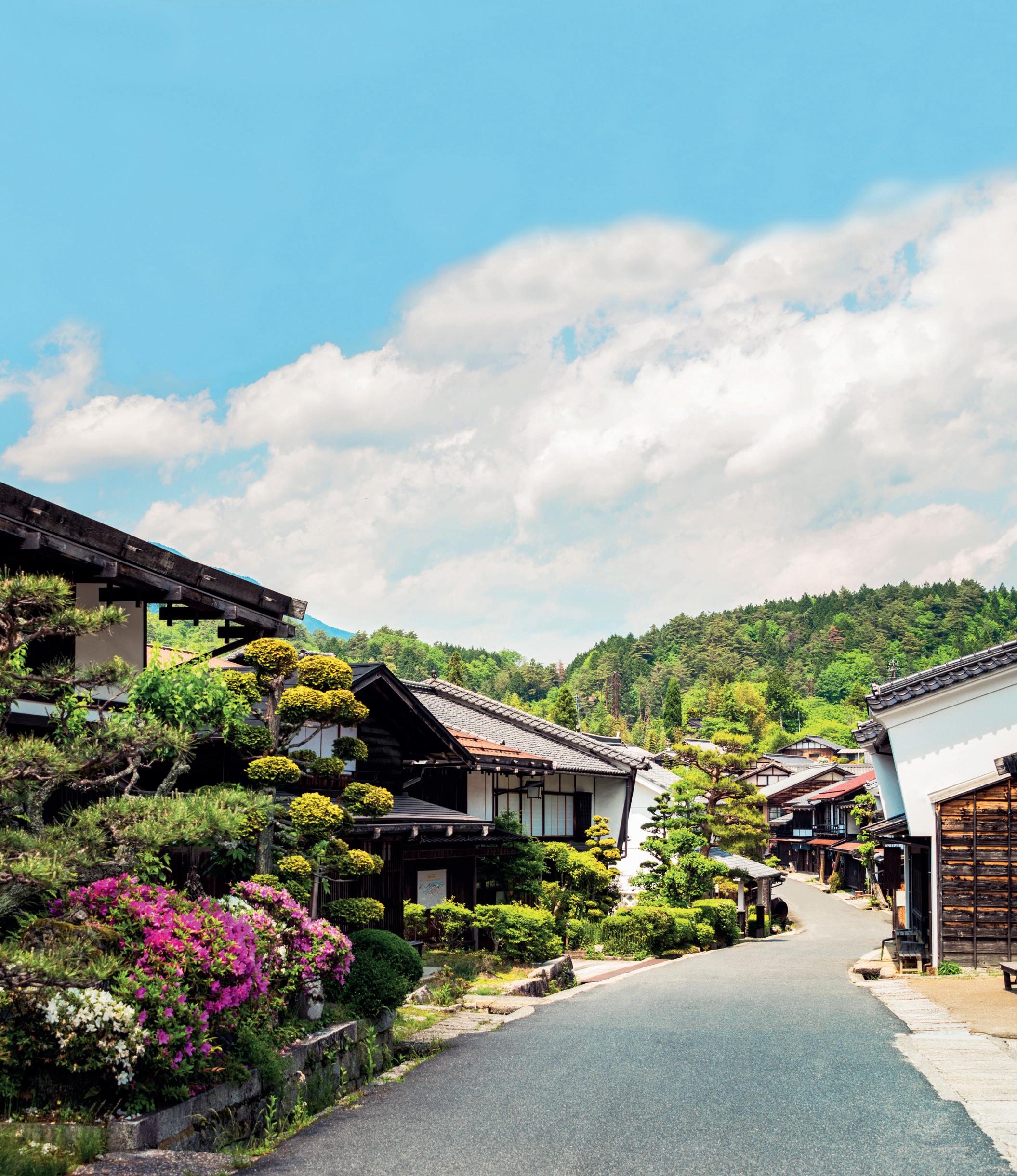

50% travel, 50% charity, 100% meaningful
50% travel, 50% charity, 100% meaningful





Ask pretty much any seasoned traveller for the destination at the top of their wish list, and the answer is very likely to be Japan. It’s a country of intrigue and contrast, mystery and fascination, and we have a inspiring feature from this magazine’s former editor, Laura Gelder, as she follows in the footsteps of the samurai along the ancient Nakasendo Way. When she visited, she also spent time in Tokyo, Kyoto, Hiroshima and Osaka, but it was walking a stretch of the path (that once connected Kyoto with Edo – modern-day Tokyo), that proved the most rewarding. Read it on page 34.


I’m also really pleased to welcome our new columnist to the magazine this month, Richard Hammond. Richard founded the pioneering Green Traveller website way back in 2006, and has since gone on to become one of the most trusted voices in all things sustainable tourism, low-carbon travel and conscious adventure. Ahead of the launch of our new joint venture magazine Green Traveller (to be published on 1st August), Richard shares his insight on what it means to be a green traveller today. You’ll find his column on page 51.
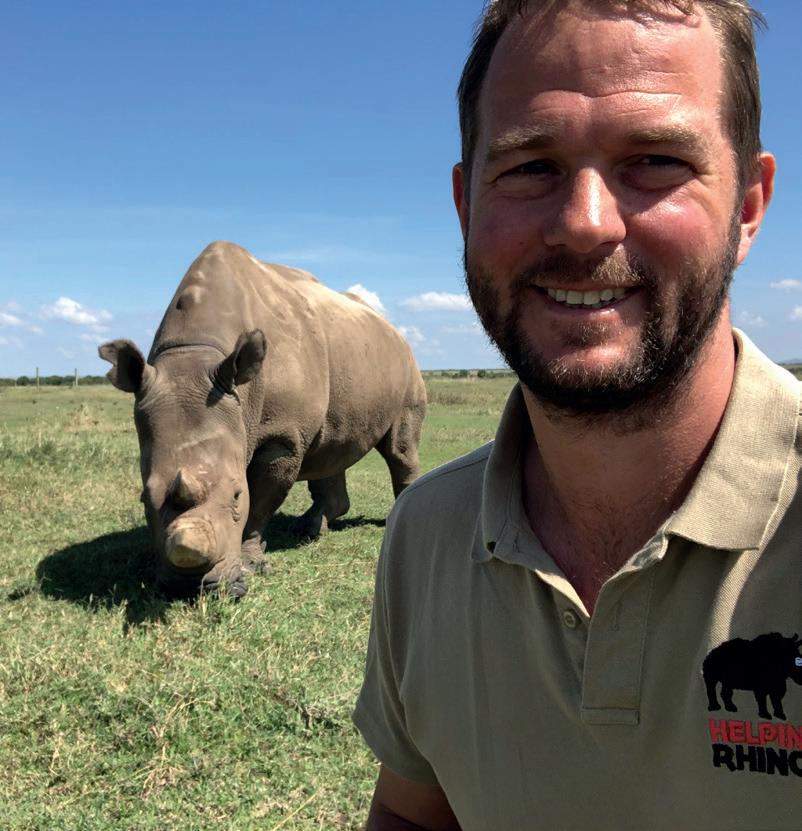
Enjoy the issue and happy holiday planning!

Richard founded the pioneering Green Traveller way back in 2006, and has since gone on to become one of the most trusted voices in all things low-carbon travel
TRAVEL 2023. CHARITABLE TRAVELLER is part of CHARITABLE TRAVEL, Fundraising Futures Community Interest Company, Contingent Works, Broadway Buildings, Elmfield Road, Bromley, BR1 1LW, UK. Putting our profit to work supporting the work of charitable causes.
omissions. FRONT COVER: istockhoto.com ICONS: thenounproject.com & flaticon.com. CEO: Melissa Tilling; MARKETING: Ally Ware, Rosie Buddell, Adam Pedley & Maddy Foot; SALES: Ali Nicholls; MAGAZINE EDITOR: Rebecca Miles (editor@charitable.travel);

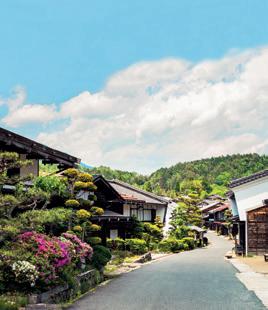
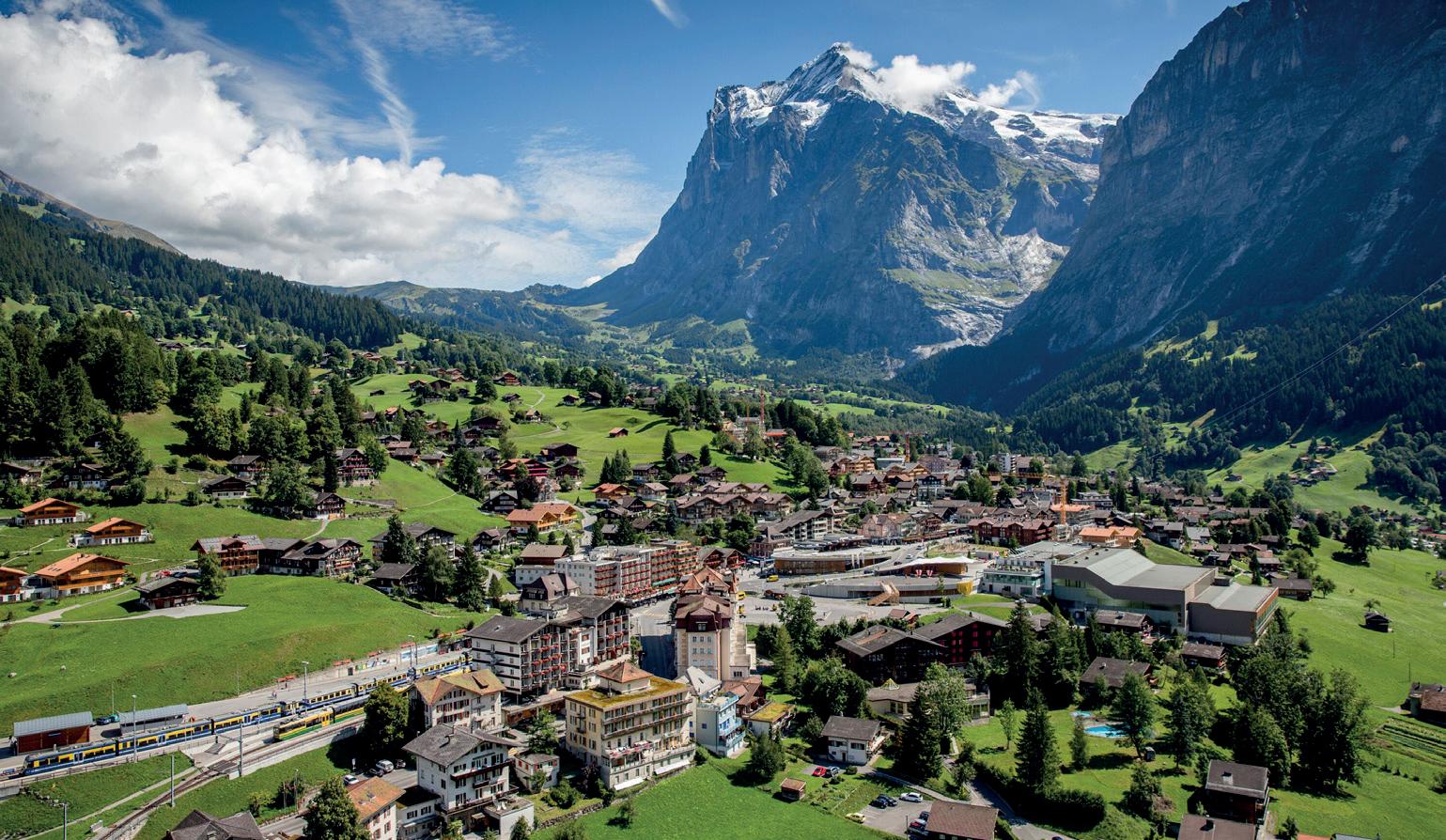


Atlantic City’s Boardwalk is buzzing, big and beautiful. Facing the mighty Atlantic Ocean, the Boardwalk has it all, from endless sandy beaches to shops, five-star restaurants, casinos, attractions and smart resorts. The Boardwalk was built in 1870 to keep the sand out of the fancy resorts that were popping up along the shore, and it’s since become an American icon. Could there be a better way to spend the day than in timeless Atlantic City fashion, mixing up fun on the Boardwalk with being in and on the ocean, surfing, fishing and parasailing? charitable.travel/north-america/ atlantic-city


Discover the secret to a perfect adults-only escape, now in the idyllic Canary and Balearic Islands. Indulge with an extra measure of romance, relaxation and pampering in exquisite luxury beachfront settings. Escape the everyday, bask in the sun, stroll scenic coastlines and savor gourmet à la carte dining with Unlimited-Luxury® at Secrets® Resorts & Spas.

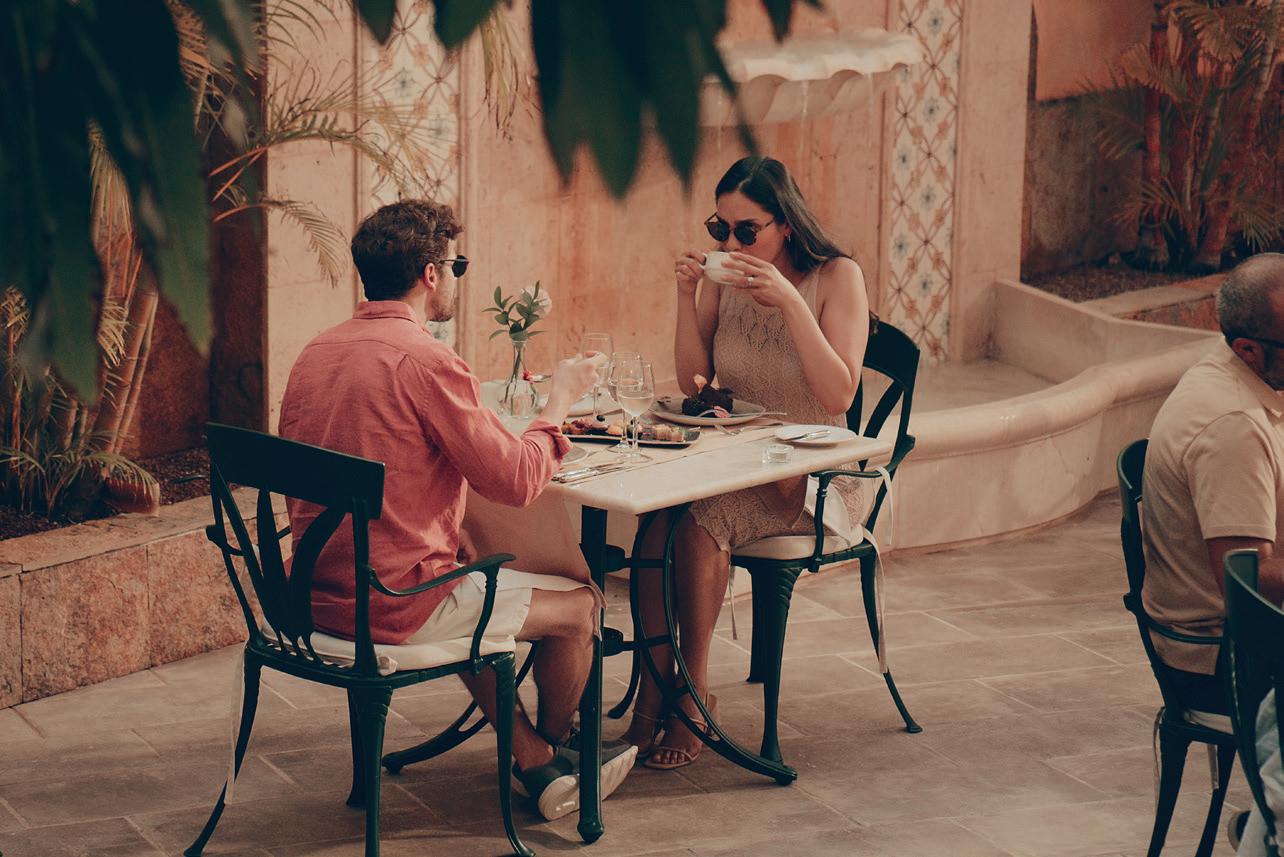

LIMITED TIME OFFER

www.offers.charitable.travel
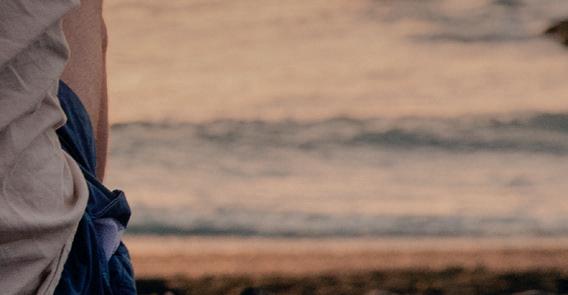

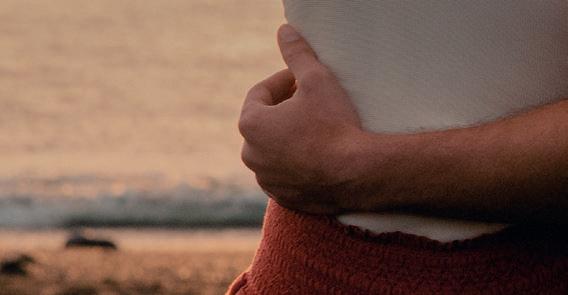













The winners of Ocean Conservancy’s Annual Photo Contest have been announced, and as to be expected from the non-profit environmental advocacy group based in Washington, the standard is as high as ever. This image, by Maximilian Holba and titled The Shallows, won the Spectacular Seascapes category and shows the diversity to be found on the seabed of the Pantar Strait in Indonesia’s Alor Islands. The other categories were Marine Wildlife, Human Impact and Judge’s Choice. The contest is free for anyone to enter and the winners are voted for by the public. Budding photographer? Enter next year’s contest.

There’s a wealth of world-class culture taking place in Italy’s Trentino region this summer and autumn. Hosted in the many castles that dominate this region in the southern Dolomites, and easily reached from Milan, Verona, Venice and Bologna, highlights include the muchanticipated ‘All Crazy for Japan’ and ‘Encounters in Japan’ exhibitions at Castle Stenico, and the Trentino dei Castelli train ride that takes in four of the region’s most spectacular castles in one day while offering delicious refreshments made from local produce. Or opt for a private tour of Castel Valer, one of the few castles in Trentino still lived in today.





EUROPE SUMMIT IN BRUSSELS, GOOGLE REPORTED A 36% INCREASE IN SEARCHES FOR ‘SUSTAINABLE TRAVEL’ IN THE PAST 12 MONTHS
SO MUCH TO LEARN FROM THE AMAZON
Finding the four children who were lost in the Amazon rainforest for 40 days was hailed a miracle, but an anthropologist, who has spent more than a year living among the Andoque people in the region, was not surprised. Eliran Arazi, writing in Positive News, attributed the children’s survival to their profound knowledge of the intricate forest and the adaptive skills passed down through generations of Indigenous people. Activities most western children would be shielded from provide valuable zoology lessons.
TAKE THE TRAIN, BIKE OR FERRY THIS SUMMER
A trio of developments will make travelling around Europe less carbon intensive this summer. Firstly, new train routes have been announced, including an affordable sleeper train between Brussels and Berlin, via Rotterdam and Amsterdam, and a luxury overnight option from Paris to Vienna on ÖBB’s next-generation locomotives. Secondly, for cyclists there are now 90,000km of cycling paths along 17 long-distance routes to connect the continent via the EuroVelo network. And lastly, the world’s largest hybrid and double-ended ferry, operated by P&O, has begun crossings in the English Channel between Dover and Calais.
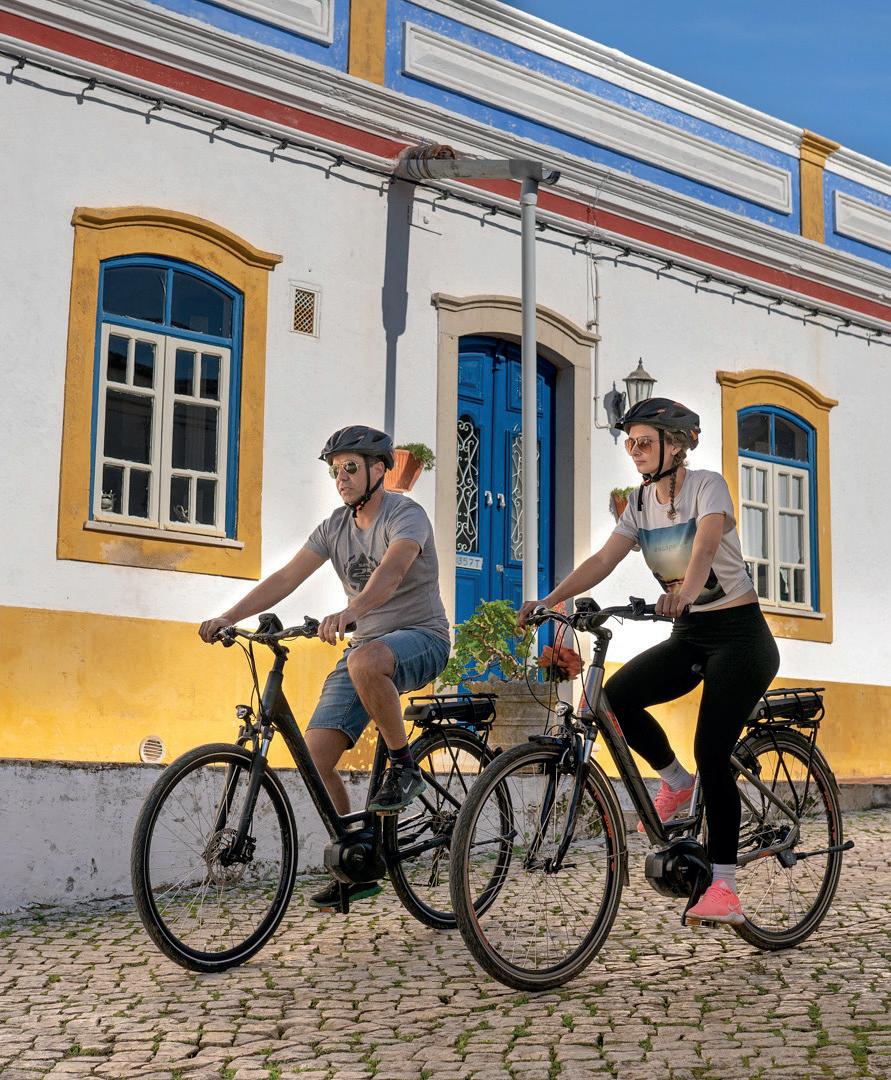
The Marine Conservation Society has announced a raft of positivity from the oceans, as part of its #OceanOptimism initiative. Making the headlines include: an action plan to reintroduce critically endangered sturgeon to UK waters (they’ve been almost wiped out from UK rivers in recent years); Ocean Census sets out to identify 100,000 new marine species in 10 years, with the aim that the discoveries will support decision-making to protect and conserve the ocean; a 10-tonne mass of plastic pieces and fishing gear has been cleared from Skye’s beaches and will be recycled into pot plants; artificial rockpools have been created in Bournemouth and the Isle of Wight and have fast become a haven for molluscs, fish, sea sponges and crabs; plastic pollution in the sea could be cut by 80% by 2040, thanks to such practical changes as eliminating unnecessary plastic, using greener alternatives and increasing reuse of plastic; and record numbers of olive ridley turtles are nesting in Bangladesh, an increase of 30% on last year, thanks to conservation efforts.
The Queensland government in Australia has officially changed the name of one of its most treasured and culturally significant destinations to its Traditional name of K’gari (formally Fraser Island). The world’s largest sand island is World Heritage listed, and you’ll find rainforests growing on the sand and freshwater lakes shimmering against the sky. The name change formally recognises the Butchulla People’s connection to the island and the creation story that has been passed down for generations.

Responsible and certified B Corp travel agency Travel Matters is running two ecoconscious retreats in an Edwardian lodge on the banks of Loch Tay in Scotland. Featuring a mix of cold water swimming, painting, and food from a former Scottish chef of the year, the four-night retreats in September and October promise utter rejuvenation.
For more information contact Travel Matters and quote Charitable Traveller

After more than 20 years of planning, the International African American Museum in Charleston, South Carolina has opened.
Chronicling the history of enslavement, starting in 300 BCE, it’s built in what was once of the most prolific slave-trading ports in the US.Elijah Parry at Unsplash

Taking a road trip across Europe in an electric car is no longer a pipe dream. With a rapidly growing charging infrastructure and the ever-improving battery range of new EVs, an electric road trip adventure is more accessible than ever, and Lonely Planet’s latest book celebrates exactly this. With the aim of giving travellers the confidence to explore beyond the cities, Electric Vehicle Road Trips of Europe details which countries have the best rental and charging infrastructure, as well as detailing 60 of the most scenic drives across the continent.
While Norway, the Netherlands, Germany, Austria and Slovenia are leading the way in providing nationwide EV networks, there are plenty of sublime touring routes to be found, including in the UK and Ireland. The new guide is designed to help expand the horizons of electric vehicle owners and try-before-you-buy experimenters, who can do so by hiring an EV to enjoy a road trip on a wide variety of routes. Carefully mapped out with detailed itineraries, illustrated
maps and charging station locations, the routes range in duration from a few hours to a week or more, are graded by difficulty, and accompanied by awe-inspiring photography and practical information.
“I hoped that Electric Vehicle Road Trips of Europe would serve two purposes: reassuring those who own or lease EVs that interesting travel options are available to them, and inspiring those who might consider owning or leasing an EV. Electric vehicles take the complexity out of multi-city European road trips, where emissions regulations are more complicated than ever. Our routes, used in conjunction with apps that make finding chargers easier, also prove how relatively adventurous destinations are now easily reachable by EV,” said Peter Grunert, author of the Lonely Planet EV Road Trips of Europe book.
Lonely Planet’s Electric Vehicle Road Trips of Europe is out now in hardback for £25, available where all good books are sold.
Win!
We’ve got 10 copies of Electric Vehicle Road Trips of Europe to give away – to be in with a chance of winning one, visit charitable.travel/lonelyplanet to enter competitionour


Let Lonely Planet guide you on a road trip through Europe with a modern twist – driving an electric vehicle
The blind comedian Chris McCausland has teamed up with four comic friends to figure out if the tourist trail offers any pleasure to those who can’t see the big attractions. McCausland’s new travel show, currently airing on Channel 4, has Harry Hill accompany him to Athens (will Hill’s description of the Acropolis do it justice?), Tom Allen take him to Rome (will gladiator training pay off?), Gus Khan ride camels with him in Petra, and Liza Tarbuck join him at the very noisy Niagara Falls.

This is the ultimate book for armchair travel – an inspirational guidebook to recreating an authentic Japanese experience, without leaving the comfort of your own home. Whether you’re dreaming of visiting or know the city well, self-confessed shinnichi (Japanophile) Michelle Mackintosh reveals her favourite 50 quick, easy and kawaii (the culture of cuteness) activities to recreate the sights, sounds and smells of Tokyo. Set up your own cat cafe, delve into the J-POP archives and learn how to recognise written Japanese, wherever you are.

Celebrating the quirks, charms and beauty of the Channel Islands, this new six-part series is proving a hit on Channel 5. Narrated by Alan Titchmarsh, episodes so far have included Jersey farmer Phil harvesting the season’s Jersey Royal Potatoes with a 100-year-old hand plough, a look behind the scenes at how traditional Guernsey jumpers are made, and asks if life really is a beach for caterer Mim Sarre, who runs a pizza oven van on Guernsey’s Cobo beach. Highlights to come include the celebrations for Liberation Day across the islands.

‘Travel has lost its way.’ That’s the hard-hitting message from The Last Tourist, an award-winning documentary that takes an unflinching look at the impact of mass tourism on the environment, wildlife and vulnerable communities around the world. Filmed across 16 countries and executive produced by Bruce Poon Tip, the founder of G Adventures (an adventure operator and community tourism pioneer), the featurelength documentary empowers audiences with the knowledge and inspiration to make a positive impact with their travel. It’s now available to stream on UK platforms.

This issue, it’s thought-provoking travel docs that’ll encourage you to see the world anew, and escapism to Japan and the Channel IslandsSamuel Sulaiman at Unsplash

The Bluestone National Park Resort is both an epic family haven and a pioneering sustainable business, leading the way in innovative answers. Rebecca Miles visits to find out how it combines the two


People say it’s what under the surface that counts, but at the Bluestone National Park Resort in Pembrokeshire, what’s on the surface counts too. Because this holiday park is the first business in the world to recycle disposable nappies, the bane of bins the world over, and use them to make and lay tarmac on its new roads for some significant surface-level sustainability.
This next-level innovation is just one of the many sustainable initiatives Bluestone has. Others include having the first water park to be heated with locallysourced biomass instead of oil, and building its own 11-hectare solar farm to help it become net zero by 2040.
The wonderful thing about Bluestone is you can come on holiday here and, if you wish to, remain blissfully ignorant about all this ‘do-gooding’. These efforts aren’t rammed down holidaymakers’ throats. Yes, there are precise recycling guidelines and electric vehicle charging points, but Bluestone is first and foremost a place for families to come and have fun, and that’s exactly what we do.
Founded by William McNamara 15 years ago, he had the vision of turning his huge, intensive monoculture diary farm, between Narberth and the Pembrokeshire Coast National Park, into a joyful, vibrant and natural place for families to come on holiday and for children to roam free in.

Looking across the 500 acres of wooded valleys and rolling hills from the park’s entrance, it’s hard to imagine what this landscape must have looked like 20 years ago. Today, the car-free site is full of trees, a lake and 344 well-spaced out lodges and cottages that can sleep up to 14. Most of Bluestone is designated a nature reserve
and there are over 100 indoor and outdoor activities for families. The main hubs include the Blue Lagoon water park and pool, the Serendome, a huge covered play park with a Sky Walk, sand and water play zones and the outdoor amphitheatre Cloud Theatre, and the Steep Ravine, with high ropes courses and woodland adventure activities.
We, my husband and I and our six-year-old daughter, quickly settle into a playful rhythm of free-range exploring, organised activities and plenty of eating and drinking during our four-night stay. We’re self-catering (as all the accommodation is) in one of Bluestone’s two-bedroom Ramsey lodges, overlooking the lake. When
around the lake. The illuminated enchanted trail is full of surprises and sets a playful tone – favourites include the shadow puppet theatre, the drum machine that lights up the nearby trees and the flashing neon stepping stones.

Despite it being half term and the resort at near-full capacity, Bluestone never feels crowded. The only time we notice how busy it is is queuing for the water slides in the Blue Lagoon Water Park. Spending time in this vast dome, where a lazy river, wave machine and inflatable slides keep both adults and children entertained, is one of a handful of free activities in the resort. The others are the Hive, full of inflatables, climbing towers and a super-sized soft play, the sand and water play in the Serendome, the playground in the village centre and the woodland walks (seek out the Troll Bridge and Fairy House); everything else must be booked and paid for in advance.
we visit during the February half term, the annual Winter Lights Festival is in full swing, where Mr Wonder, a silly and accidentprone wizard, has made a host of unusual installations appear
Speaking to other families here, it’s clear that Bluestone gets under your skin. Only one of the many families I chat to are visiting for the first time – everyone else is on a repeat visit, some with

Looking across the 500 acres of wooded valleys it’s hard to imagine what this landscape must have looked like 20 years agoBLUESTONE’S WINTER LIGHTS FESTIVAL A WALK WITH THE FAIRIES
grandparents in tow. And there’s much disagreement about the best age for children to be to make the most of it. Our six-year-old is young enough to still be enchanted by the mystical magic of fairies on the Secret Village walk and Mr Wonder, old enough to clamber and climb through the vast indoor soft play indoor climbing frame in the Hive and independent enough to enjoy the adult-free film and fun night, but not yet old enough for the more adventurous activities, such as coasteering, stand up paddle boarding, archery, high ropes and bushcraft fire lighting. The roam free ethos means there’s no obligation to stay within the resort. Some of the activities – mountain biking, coasteering and canoeing – take place further afield on the rivers and coastline of the Pembrokeshire Coast National Park. Children need to be eight and older to do these, so instead we hunt for fossils on Barafundle Bay, go rock pooling at Freshwater West and enjoy windswept ice creams in cutesy Tenby.
Sustainable family holidays


We can’t leave Tenby without picking up some fresh fish from Simply Seafoods, a little hut right on the harbour, to cook back at our lodge. Another evening we eat at the Oak Tree restaurant in Bluestone, which like all the restaurants, cafes, takeaways and stores in the resort sources as many ingredients as possible from local suppliers.
Many of those suppliers are based in the neighbouring town of Narberth, a small market town with a thriving high street of independent businesses. We’re spoilt for choice on where to eat, but settle on Ultracomedia, a Spanish deli and cafe. It’s so good some friends on the next table have travelled for over an hour. We eat so well during our stay I’m secretly pleased we missed out on booking one of the limited number of electric golf buggies families can hire to get around the sprawling, hilly resort. Instead, we huff and puff our way up the hills on pedal bikes, gleaning a mite of pleasure in feeling virtuous in our exercise.
To attempt some semblance of balance on the child versus grownup activity swingometer, we book Evie into an afternoon of child-care at the Nature Art workshop and head to the award-winning Well Spa in the village centre. After a couple of hours relaxing in the Thermal Suite of saunas, steam rooms ice pod and hydrotherapy pool, I settle in for a hot stone massage in one of the treatment rooms.
And just like the rest of Bluestone, it gets me on the surface as well as under it. Turn
All the restaurants, cafes and stores in the resort source as many ingredients as possible from local suppliersTHE WELL SPA
Sustainable family holidays


Sustainable family holidays take many forms. Essentially holidays with purpose, these picks offer a mix of supporting locally owned operations, helping countries recover from natural disasters, and lower carbon footprints, all while providing priceless family memories
One for all three generations of the family, opt for a Le Boat holiday in Holland and it’s easy to reach its base in Vinkeveen without flying. It’s either three and a half hours drive north-east of Calais, or 8km from the closest train station at Abcoude. Once on board one of Le Boat’s reliably family-friendly boats – that sleep from four to 10 people – you can be in the heart of Amsterdam in four and a half hours, trendy Utrecht in four, and among the windmills, tulip fields and famous cheesemaking towns of Gouda and Edam in two to four days. Spend a week on the canals and everyone on board, from the youngest to the oldest, won’t want to get back on dry land.

DETAILS Le Boat offers seven-night boat hire starting from £1,019, including on-board equipment, a fully stocked kitchen, towels and linen, and boat handling demonstration and support.
St. Pete/Clearwater has the perfect ingredients for your best vacation yet: beautiful beaches, vibrant arts, a superb food and drink scene and a commitment to environmental sustainability. Let’s shine—plan your charitable travel at charitable.travel/sustainable-st-pete-clearwater



For an adventure to cherish, book the family on Intrepid’s road trip through South Africa and Eswatini and pitch your tent in some of Southern Africa’s greatest game reserves. With a mix of accommodation in hotels, permanent tents and camping with basic facilities, where everyone is expected to pitch in and help set up camp, this is a rare opportunity to camp under the African night sky. The centrepiece is the chance to see the ‘Big Five’ game of Africa in the Kruger National Park, but also worth travelling for is camping near a watering hole in the Hlane National Park, visiting a Zulu village and taking a guided hike through Blyde River Canyon.
DETAILS Intrepid offers a 12-day trip with regular departures throughout the year, including some meals, overland transport, accommodation and activities, from £1,384pp. It’s open to children aged 10 and up.



Embark on your own modern version of the European Grand Tour and give your children a taste for Interrailing with a train journey across Europe, taking in four cities in four countries. For budding historians there’s no better city to start with than Rome (reached by train from London St Pancras with an overnight in Geneva), before travelling on to Zurich, Paris and Amsterdam. A wonderful eye-opener for children of all ages to see some of Europe’s oldest and most culturally important cities, the train journeys between each city will be almost as enchanting as the destinations.
DETAILS Railbookers offers a 10-night European tour of four cities, adapted for Charitable Traveller to include return train travel from London St Pancras, from £1,649pp including rail travel, B&B accommodation and some small guided tours.



Sri Lanka has had a rough old time of it over the past few years, and by visiting you’d be playing an important part in supporting the local economy and communities, who rely so heavily on tourism. Despite being an island, Sri Lanka is bigger than you likely imagine so focus on seeing a few parts of it well, rather than all of it in a rush. In two weeks, you can expect to reach from coast to coast as well as exploring the Cultural Triangle in the centre of the island and the peaceful tea plantations around Kandy. A holiday to remember, there’s even the chance to spot elephants on safari.
DETAILS Audley Travel offers a 12-night/14-day private guided holiday, including flights and all transfers, as well as activities and excursions, from £5,150pp.
Room to Reward is a unique charity created to say ‘thank you’ to the Hidden Heroes - inspirational volunteers who give up their time to make a difference to those who need it most.

Our hotel partners donate their unsold rooms, charities and community groups nominate their Hidden Heroes for a break - we make it happen!
FIND

Help Turkey recover from its most powerful earthquake in 80 years on an active family holiday in the picturesque seaside town of Kas, on Turkey’s Mediterranean coast. Base your brood here for the week with Explore, and expect a packed itinerary of sea kayaking over the ruins in Kekova Bay, canoeing down the Xanthos River, daily snorkelling sessions, and walking through the foothills of the Taurus Mountains. Aimed at families with children of all ages, the average age is 11.

DETAILS Explore offers a seven-night holiday to Kas, including B&B accommodation and itinerary activities, from £660pp.

Send your teenagers off into the big wide world with one last hurrah – an epic road trip along the Pacific Coast of America with an eco twist, hiring an electric vehicle (EV). Charging points along the Californian coast are so numerous that this is one of the best US road trips to do an EV. Starting in San Francisco and spending over two weeks travelling south to the sandy coves of Laguna Beach, it’ll be a holiday to remember and full of iconic moments, including catching the surf in Big Sur, celeb spotting in LA, and generally soaking up the laidback Californian vibes along the route.
DETAILS Charitable Travel offers a 15-night holiday, including flights, accommodation and EV hire car.




Set yourself the ultimate running goal in 2023, and achieve it with personalised guidance from inspirational ‘Marathon Man’, Rory Coleman. Run ten kilometres a day over five unforgettable days, through the spectacular natural landscapes and beautiful cities of the Danube, totalling 50 kilometres of new discoveries, new friends and new feelings of remarkable personal achievement.

This incredible challenge is open to everyone, all you need is determination and commitment. The reward will be all yours.
you invest in this challenge, Rory will offer one-on-one guidance and tools to prepare you mentally and physically for success.
Departs 25 October 2023, 6 Night Premium




Arriving in Helsinki, the capital of Finland, I dive straight into the city’s innovative food scene.


First stop is YesYesYes, a perfectly Instagrammable and bustling bar and restaurant in central Helsinki. The vegetarian menu changes seasonally, so whenever you come, you can count on the freshest and most delicious food sourced from local farms. Given that I’m here in May, there are a lot of strawberries and asparagus on the a la carte menu.
I’m staying at Hotel Marski by Scandic, and it’s both well priced and well located, just moments from the central train station. After a hearty breakfast of a glass of blueberry juice, porridge and a Karelian pie, a rye pastry filled with savoury rice pudding and topped with a hard-boiled egg mixed with butter, I head out for a walking tour of Helsinki with Kristina Kajaani-Kurki, an official Helsinki tour guide. Our first port of call is the Oodi Public Library, built in 2018 to celebrate the 100th anniversary of Finnish
independence. The library is a shimmering gold swath of a building topped with a sweep of glass, and I’m struck by the volume of free-to-use equipment and resources available here.

Kristina tells us Helsinki has Northern Europe’s largest concentration of Art Nouveau buildings (Jugend Hall is a great example).

We also pass a Russian orthodox cathedral and a mid-century collection of restaurants, built for the 1952 Olympics.
From the harbour, we take a ferry to visit Suomenlinna Island, a few kilometres south-east of the city centre. Suomenlinna translates to ‘Finnish Fort’ and has a long military history. It has often changed ownership between Sweden, Russia and Finland – all of which left their mark on the structures and buildings on the island. Today, Suomenlinna is a perfect place to escape the bustling city for a picnic in the sun, with a cold Long Drink – a Finnish favourite of gin and flavoured soda water – and to reflect on this beautiful city full of friendly people and good food.
Helsinki is one of Europe’s greenest capital cities – 40% of its land is covered in nature
Over 300 islands are in Helsinki’s archipelago – you’ll find lush forests, sandy beaches and bars

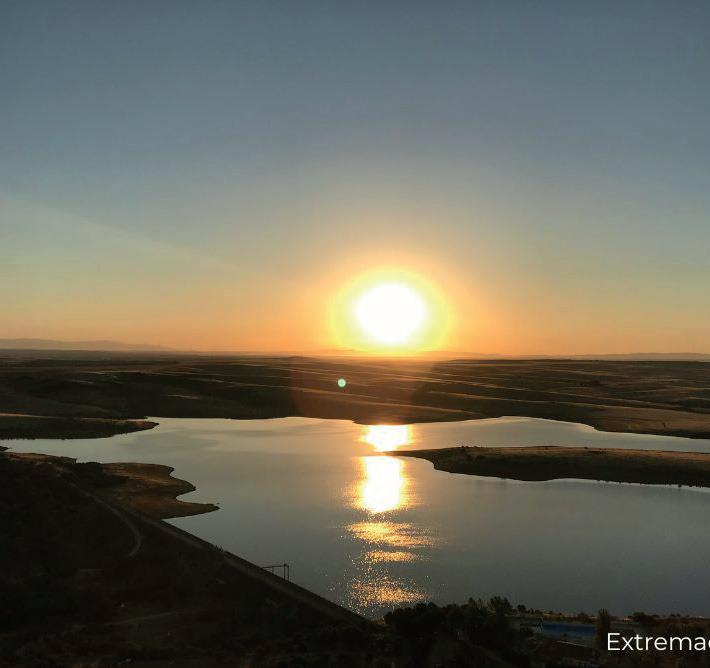 By Lizzie Trimble
By Lizzie Trimble
For all the nature-loving history and movie buffs out there Extremadura is the little known region of Spain you should consider visiting soon. Found on the border with Portugal and south west of Madrid, it’s in the process of being made easier to access thanks to the gradual opening of the Madrid-Extremadura highspeed train line. When the line is complete, it’ll take approximately 90 minutes to reach the region from the Spanish capital, Madrid.
I travel from the capital, but it’s also possible to reach Extremadura from Seville – either route is straightforward, and it means you can easily add on a few days in either of these beautiful cities to your visit.


The countryside in Extremadura includes lots of lush green valleys and is dotted with charming old-fashioned villages, plus a new national park – Monfragüe – and a couple of natural parks, Tajo International, and Cornalvo and Sierra Bermeja, which are rife with spectacular birdlife. I lose count of the number of birds of prey I see.
We visit Plasencia, a city

in the north of the region. Full of historic palaces and ancestral homes as well as a spectacular cathedral, it was an important destination on the Vía de la Plata (Silver Route) that was built in Roman times and ran north to south through Spain.
I move on to the city of Cáceres, its Old Town granted UNESCO World Heritage status because of its blend of civilisations throughout history. The medieval walled city is one of the filming locations in the Game of Thrones ; we take an early morning balloon ride over the city, which is spectacular.
Our next stop is Merida, where we are lucky to arrive for the weekend of the Emerita Lvdica festival when Merida relives its Roman past with mock gladiator fights and legionaries marching across the longest remaining Roman bridge. Merida’s Roman amphitheatre is one of the largest and best-preserved in the world and the city was home to the gladiator whose story was told so epically by Ridley Scott in the 2000 film.
The region produces some delicious cheese and Iberian ham, as well as fantastic wine
There are many wonderful hotels here; lots of them converted palaces that now offer fabulous accommodation
Ca´ceres Sunset
Lying off the southern coast of England is the captivating Isle of Wight, an undisputed treasure for those seeking a relaxing and refreshing getaway. With its stunning landscapes, rich history, and commitment to sustainability, this Island destination offers a unique and inspiring experience for all who visit. So why not embark on a journey that not only rejuvenates your soul but also respects and preserves the natural beauty of this remarkable place.
The Isle of Wight boasts breathtaking landscapes that will leave you in awe. With over 50 percent of the Island designated an Area of Outstanding Natural Beauty, there are miles upon miles of stunning coastline and beaches to explore, hidden coves and pretty walking trails, unspoiled landscapes, clear waters and thriving wildlife. Immerse yourself in its diverse ecosystems, from tranquil woodlands to picturesque coastal paths. Explore the renowned Needles, with the iconic lighthouse standing at the end of the three jagged chalk stacks, or wander through the enchanting Ventnor Botanic Garden.
Every step on the Isle of Wight reveals a new vista, reminding us of the importance of sustainable tourism in preserving such wonders for future generations. The landscape is in fact so special that it has been acknowledged as a UNESCO Biosphere Reserve, one of only seven in the UK.
Sustainability lies at the heart of the Isle of Wight, making it a haven for environmentally conscious travellers. Many accommodation providers,

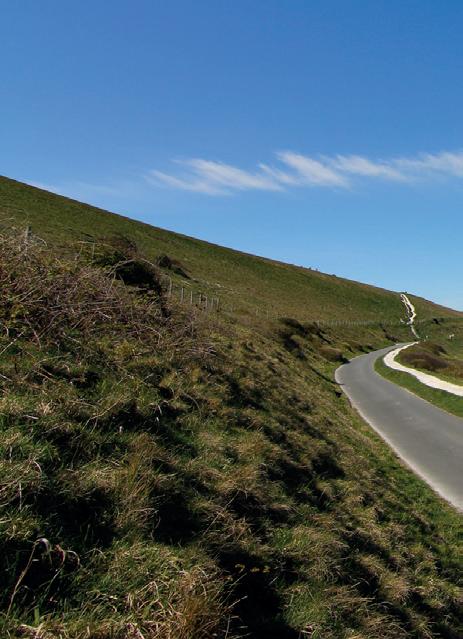


attractions and travel providers on the Island have embraced eco-friendly practices, ensuring that your stay minimises negative impacts on the environment. Take comfort in knowing that your visit supports local businesses and their sustainable efforts.
One of the most delightful ways to explore the Isle of Wight sustainably is by bicycle. The Island has an extensive network of cycling paths, allowing you to effortlessly navigate its scenic landscapes


producers at shops such as Harvey Browns, you contribute to the sustainability of the Island’s vibrant culinary heritage.
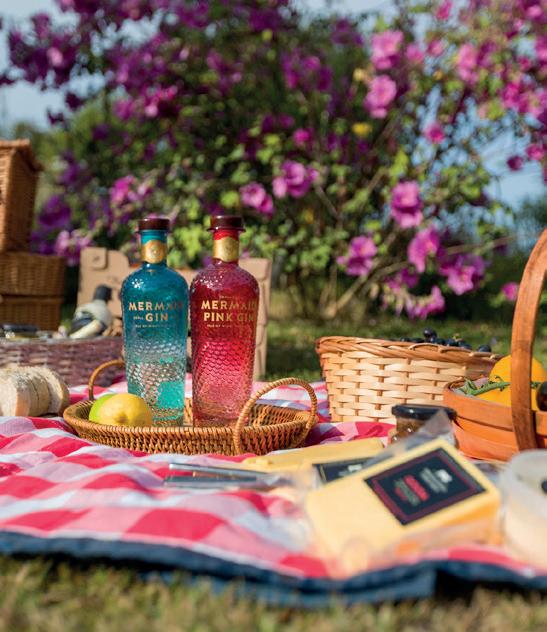
In addition to its natural splendour, the Isle of Wight offers a wealth of cultural and historical treasures. Step back in time as you visit the magnificent Carisbrooke Castle, where you can immerse yourself in centuries of history and breathtaking views. Explore the world-famous Osborne House, the former residence of Queen Victoria and Prince Albert, and discover the opulence and grandeur of the Victorian era.
If you like the sound of the Isle of Wight, talk to one of our travel consultants about creating your next holiday: charitable.travel/isle-of-wight


contributing your time and effort, you become an active participant in protecting the Island’s delicate ecosystems.
while minimising your carbon footprint. Discover hidden coves, charming villages, and picturesque countryside as you pedal along peaceful routes. Immerse yourself in the Island’s beauty at your own pace and let the invigorating sea breeze rejuvenate your spirit.
Food lovers will be delighted by the Isle of Wight’s commitment to sustainable and locally sourced produce. Experience the Island’s vibrant food scene, where fresh seafood, organic vegetables, and artisan products take centre stage. From quaint cafes to award-winning restaurants, such as The Garlic Farm or Briddlesford Farm, indulge in delectable dishes that celebrate the Island’s natural bounties. By supporting local farmers and
As you immerse yourself in the Isle of Wight’s wonders, consider participating in various conservation activities. Join beach clean-ups at Sandown Bay, nature preservation projects, or educational initiatives that promote environmental awareness. By engaging with the local community and
In every corner of the Isle of Wight, sustainability intertwines with the Island’s charm, creating an unforgettable destination for eco-conscious travellers. From its awe-inspiring landscapes and commitment to renewable energy to its culinary delights and historical heritage, this Island paradise offers a sustainable haven like no other.
Discover the Isle of Wight and leave only footprints, taking cherished memories and a renewed dedication to sustainable living back home. By embracing the Island’s ethos and being mindful of your impact, you become an ambassador for sustainable tourism, ensuring that future generations can also experience the magic of this extraordinary place.
So, what are you waiting for? Say Yes to adventure, exploration, and a sustainable trip. Say Yes to the Isle of Wight.
Immerse yourself in the Island’s beauty at your own pace and let the invigorating sea breeze rejuvenate your spiritA FOODIE’S DELIGHT OSBORNE HOUSE
SEE THE WONDERS OF INDIA'S GOLDEN TRIANGLE AND CARE FOR ELEPHANTS AND SLOTH BEARS



14 DAYS FROM £1,299PP
VISIT DELHI, AGRA, AND JAIPUR OVER 8 DAYS BEFORE SPENDING 5 DAYS VOLUNTEERING AT THE AND CARING FOR RESCUED ELEPHANTS AND SLOTH BEARS.

WILDLIFE SOS ELEPHANT CONSERVATION AND CARE CENTRE, AGRA BEAR RESCUE FACILITY

Giles Clark, a conservationist and TV wildlife presenter, is patron of Helping Rhinos and supports the charity in a variety of ways, most recently completing a sponsored ultra marathon in Laikipia, Kenya. Here, he shares why


Within half an hour of setting off, we’d been brought to a halt to let a rhino and her baby cross the path ahead of us. Later that day we paused again, this time to let a herd of elephants make their way to a watering hole. I remember I had tears in my eyes and felt so privileged to be experiencing this.
I first signed up for the For Rangers Ultra Marathon in Kenya in 2019 and started to train really hard for it, but the pandemic meant it was postponed again and again, and I slacked off. Then, six months before the departure date, it was definitely back on – and I got into a panic and went into overdrive with my training!
I’d previously run a couple of marathons (dressed up as a gorilla) but this was my first ultra. Organised in partnership with Save the Rhino and For Rangers, an international group who provide equipment and welfare support to those protecting Africa’s legacy, I was raising money for Helping Rhinos.

It’s a self-sufficient event and I was expected to carry all my gear with me over the 230km route. It’s approximately a marathon a day for five days at an altitude of 2,000 metres
and in temperatures of over 30ºC in the day, dropping to 4ºC at night. Thankfully I didn’t need to carry all my own water as I was drinking anywhere between six and eight litres a day.
There was about 50 of us taking part, running through multiple conservancies that are teeming with iconic Kenyan wildlife. At times, it felt like a really, really long way, but I got through it by just focusing on the upcoming checkpoint and not looking any further ahead.
The rangers the event is run to benefit were on hand to keep an eye on us as we ran through the challenging terrain – the route covered grasslands, rocky hills and montane forest, and ended in Ol Pejeta Conservancy, one of my favourite wild places in the world.
I’ve been involved with Ol Pejeta ever since I was at Flora and Fauna International, and this conservancy has the single largest population of black rhinos in East Africa.
I’ve always known I wanted to work with animals and in conservation since doing some work experience at Paradise Wildlife
Park in Hertfordshire when I was 14. While I’ve primarily worked with big cats throughout my career, rhinos are so important and Helping Rhinos’ philosophy mirrors my own; long-term, security and protection alone won’t save a species, we need engagement at every level and a holistic approach.
But I was also keen to take part in the event because I’ve always also been incredibly passionate about the work that wildlife rangers do. They’re at the frontline of the conservation battle yet they’re underpaid, under appreciated, under resourced and overstretched.
Find out more, and buy your tickets for the gala, here charitable.travel/helping-rhinos/
Now I’m back in the UK, my focus is on my next event with Helping Rhinos, which is the annual fundraising Global Gala for Rhinos at the Royal Geographical Society in London on 30th September. Tickets are on sale now and it’s both a virtual and inperson event, and I’ll be speaking about the vital work we’re all doing in the field.


W a t e r - t o - G o i s a p o r t a b l e w a t e r
f i l t r a t i o n s y s t e m t h a t e l i m i n a t e s
u p t o 9 9 . 9 9 % o f a l l m i c r o b i o l o g i c a l
c o n t a m i n a n t s i n c l u d i n g v i r u s e s ,
b a c t e r i a , c h e m i c a l s a n d h e a v y
m e t a l s f r o m a n y t a p o r n o n -
s a l t w a t e r s o u r c e i n t h e w o r l d . T h i s
m e a n s t h a t y o u a c c e s s c l e a n , s a f e
d r i n k i n g w a t e r w h e r e v e r y o u a r e , w i t h o u t n e e d i n g t o u s e s i n g l e - u s e p l a s t i c b o t t l e s .
S H O P N O W W
E
C O D E C H A R T R A V L 1 5 F O R
A 1 5 % D I S C O U N T
S H O P N O W
When you purchase a Water-to-Go product using the code CharTravl15, as well as receiving a 15% discount, Charitable Travel will also donate the equivalent of a further 15% to their chosen charity partners to help fund a variety of sustainability projects.
Isaac Yiwombe is a Medic to Medic alumni having graduated with a Bachelor of Medicine and Bachelor of Surgery from College of Medicine, University of Malawi (now Kamuzu University of Health Sciences) in 2018. Here he tells us what it’s like to be an intern in Malawi, serving in the government hospitals of one of the poorest countries in the world

A typical day varies, depending on the part of the hospital you’ve been assigned that day. Some days are good, others are bad. What’s regarded as good or bad is highly subjective, determined by a wide range of factors including personal preferences. For most departments, however, the typical day is quite similar and it’s obvious the department heads share notes on how best to inspire and/or torture their intern doctors.
Medic to Medic provides scholarships to students who are at risk of dropping out of their training as health workers in Africa. Scholarships support yearly tuition fees, a oncea-semester allowance, medical equipment, books and a laptop. charitable.travel/medic-to-medic/



The first matter of the day is usually the morning handover meeting, the most nerve-wracking and entertaining part of the day. This is where the clinical team working the previous night gives a summary of the events to the doctors taking over. These meetings can be quite tense, especially if one made a mistake with a patient, or missed a critical diagnosis. On the other hand, if everything was done right, there’s usually nothing to worry about.
On some days, this is followed by an academic presentation on a particular topic, usually by a medical student or intern doctor. I look forward to these as they offer a good learning opportunity for everyone, even the attending doctors, and I particularly enjoy giving these presentations too.
Afterwards, we go to see the patients in the wards. The main wards in our tertiary hospitals (specialist hospitals) are like halls within the hospital building, with beds crammed up to offer maximum capacity. The old steel dilapidated beds are often fully occupied, sometimes with a couple of patients lying on the cold cemented floors too. There is no privacy among the patients, and infection prevention between the sick is often a challenge.
There is a grim atmosphere once you enter these wards, you can feel the hopelessness of the patients, and the hopeful eyes of their guardians praying for a miracle. Ironically, it comes with a sense of gratitude upon reminiscing on one’s own health. I am quickly reminded of my purpose and calling, and why doing my best is a matter of life and death. Several lives depend on it. During the ward round, we review and reassess the patients, and carry out any other tests or procedures as required. This is usually all covered in the morning while the rest of the day is spent completing carried over tasks, or tending to patients in the outpatient clinics .
Is breaking bad news to a family about the death of a loved one. Especially when that death could have been prevented had there been more human and material resources available.
Is seeing hope restored when a patient recovers and is discharged. Most patients do survive, and even with our limited resources we manage to help thousands. It’s worth the sacrifice and price we pay, for every patient’s life is priceless.


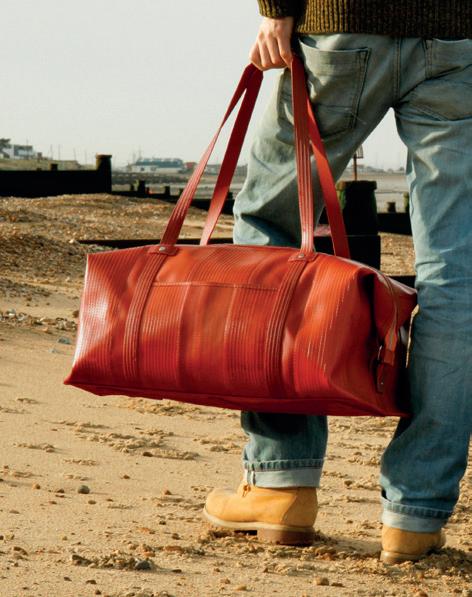


Get ready for your next holiday with essentials from these properly eco-minded brands

WATERHAUL
On a mission to tackle the ghost gear (abandoned fishing gear and nets) found in our oceans and washed up on our shores, Waterhaul created a mechanical recycling solution that processes end-of-life fishing gear and turns it into useful sunglasses, pocket knives and litter pickers. The social enterprise, founded by a group of marine conservationists in Cornwall, are so confident in the strength of their products that they offer a lifetime warranty on their sunglasses. They’ve got reason to be – the raw material they use, plastic fishing nets, are designed to be strong, durable and last more than a lifetime, which is why it’s so important these hazards are removed from the sea. Sunglasses start from £65 and offer full UVA/B 400 protection. waterhaul.co
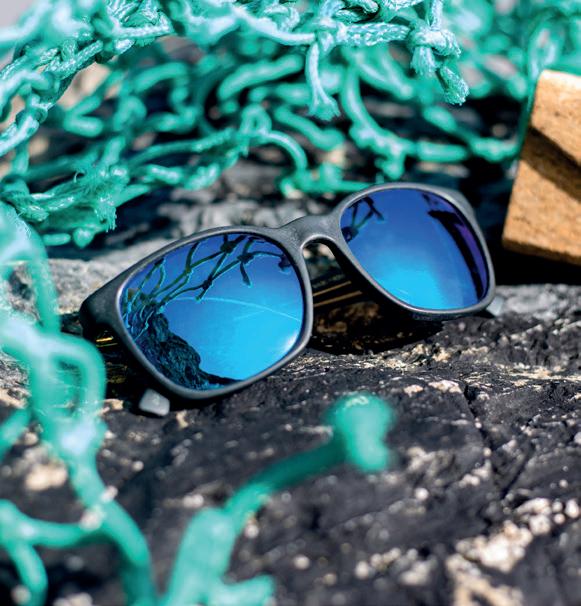
Millions of years ago, life came from the ocean. It’s time you went back for a visit.
Catch a fish, release a fish, save the memory.
What will you will find along 23 miles of white-sand beach? Gentle waves. Unspoiled and protected areas. 70 miles of hiking & biking trails. A rehabilitation center for seagulls and sea turtles. Historical sites that speak to our local history.
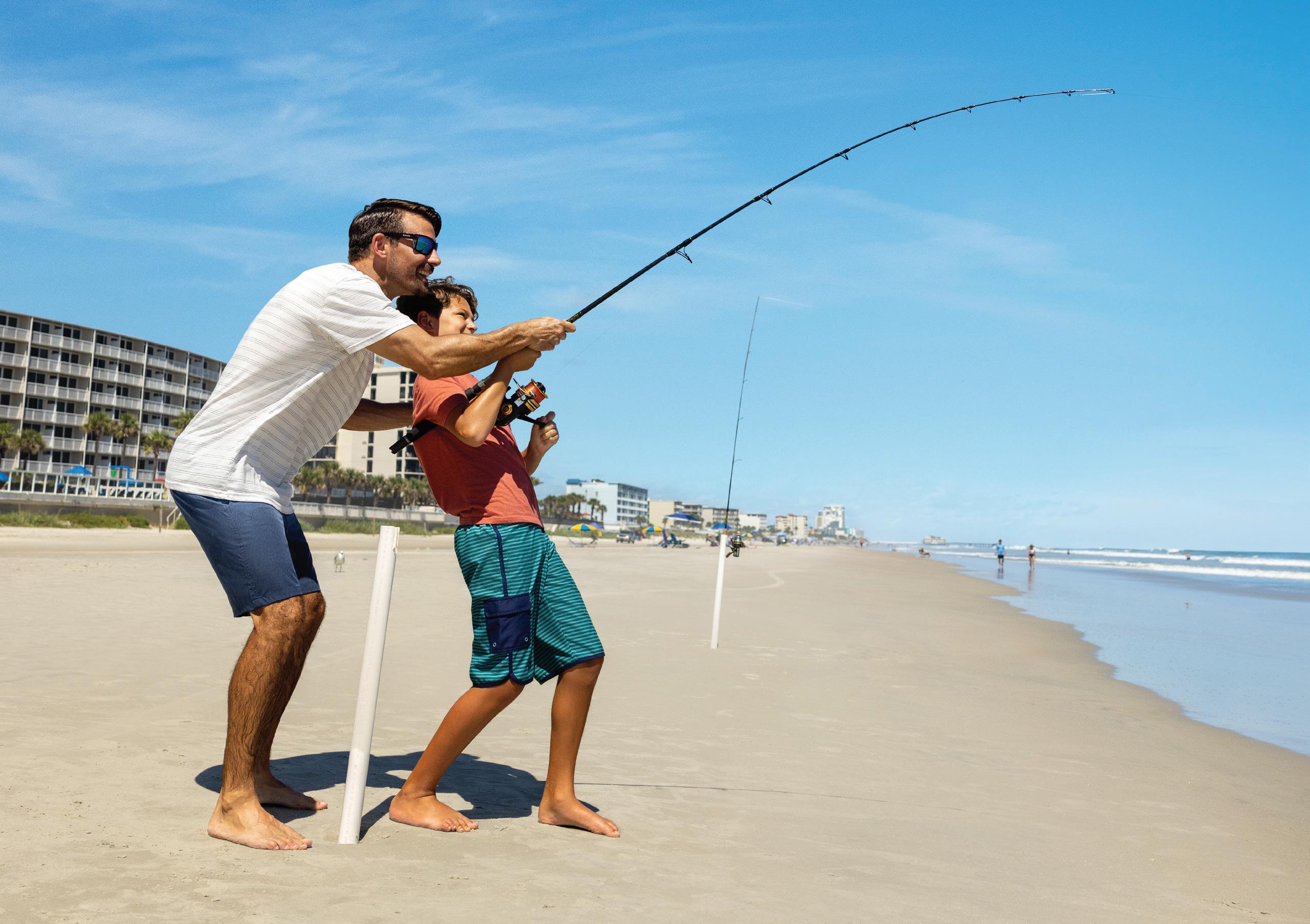
Finding the right sunscreen can be a minefield so the SPF25 mineral sunscreen from B Corp certified UpCircle is a joy. Not just the SPF, its whole range of beauty products are organic, vegan and crueltyfree, and are made using by-products from other industries, such as upcycled raspberry seed oil from the juicing industry. It goes without saying this sunscreen is reef-safe and its recyclable glass jar can be refilled. £27.49 for 60ml. upcirclebeauty.com


Providing the Holy Grail of sustainable footwear, Waves makes plastic-free AND vegan flip-flops. Many flip-flops are made from petroleumbased rubber and plastic, but Waves uses 100% natural rubber that’s FSC certified, and if you return your worn-out Waves to the company, they’ll recycle them and give you 10% off your next purchase. Available in a range of colours and patterns, prices start at £10 for children’s flip-flops and £20 for an adult pair. wavesflipflops.co.uk

Elvis & Kresse’s sustainable credentials are strong. Established in 2005 to save London’s decommissioned fire-hoses that were destined for landfill, the team of highly skilled craftspeople set about turning them into bags, and now has a whole range of luggage and accessories made from 15 different reclaimed materials. Our pick is the Weekend Bag, in bold fire-hose red and lined with material rescued from Burberry’s Yorkshire workshop and military-grade parachute silk. Elvis & Kresse offers repairs for life and donates 50% of its profits to The Fire Fighters Charity. The Weekend Bag, £315 elvisandkresse.com
The app that makes shopping for secondhand clothes a breeze, Vinted has become a byword for sustainable fashion thanks to the ease with which buyers and sellers can search and purchase not just their holiday wardrobe but their everyday wardrobe too. With so many sellers listing items on the app it’s rare to not find what you’re looking for, and at very competitive prices. Since starting 15 years ago, the company’s raison d’être has remained constant: to make second-hand items customers’ first choice and improve the industry’s sustainability track record. vinted.co.uk

—Charitable Travel
Go beyond world-famous theme parks on your next visit to Orlando — way beyond. Explore the destination’s great outdoors with lush ecosystems, ecotours, natural springs, nature trails, fishing, kayaking, airboat rides and lots of thrills. Whether peacefully paddling through spring-fed lakes or hang-gliding 600 meters above orange groves, unforgettable eco adventures serve as the perfect counterbalance to Orlando’s signature theme park fun.
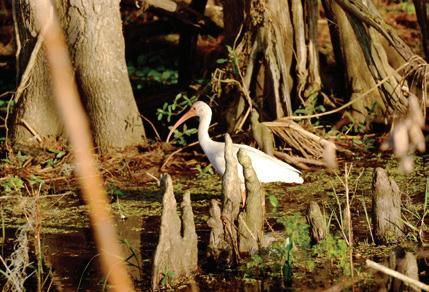



Leaving neon Tokyo behind, Laura Gelder follows an ancient mountain road through Edo-era Japan


The darkness of Tsumago wraps itself around you like a cloak. After dinner, we were urged to go for a stroll but as our inn sits on the edge of the village, after ducking out of the sliding door and past the welcoming glow of its entrance lamp, we have to feel our way down the path. The air is clear and cool and the sound of rushing water fills our ears before our eyes adjust. Above, is a map of stars, like diamanté studs in black velvet. Shrouded in darkness but looming large is Carp Rock, a giant boulder and a landmark to weary travellers for centuries.
Our starlit reverie is interrupted when we come across another
western couple, like us stumbling in the dark and dressed in an awkward combination of yukata robes and trainers. The man lets out a loud fart which carries spectacularly on the still night. We pretend not to have heard as we greet them good evening, smiling a little too wide. I wonder if Tsumago evenings are always full of tired tourists, preemptively letting off wind before they settle down for the night, separated from each other by paper-thin walls.
Tsumago is a town on the Nakasendo Way, an ancient post road connecting Tokyo and Kyoto. Meaning “central mountain route”, it winds its way through Japan’s




Central Alps for over 300 miles, dotted with 69 post towns. We have come to it from Tokyo, and the contrast is startling.


This time last night we were emerging out of Shinjuku station,

the Kiso Valley, via a bullet train to Nagoya, before changing on to the Chuo Main Line, instantly feeling the change of pace as we chugged to Nakatsugawa on a local train. From

here, a bus wound us up to Magome, past rice fields and quiet villages. Magome is one of the Nakasendo’s most polished towns. From the bus stop, a single street climbs steadily up past lovingly restored wooden buildings. With their overhanging eaves and dark wood beams, they aren’t dissimilar to Swiss chalets. It’s late October and the air is fresh in the golden sunshine. Water gushes down a narrow stream that runs alongside the street, and at several points big rustic wooden wheels are placed to catch the torrent. The noren curtains hanging over doorways, printed with kanji characters, remind me I’m in Japan. Shops sell snacks, like steamed buns filled with sweet red bean paste, and souvenirs including chopsticks, clay cats, postcards and crockery.
The Nakasendo was established in
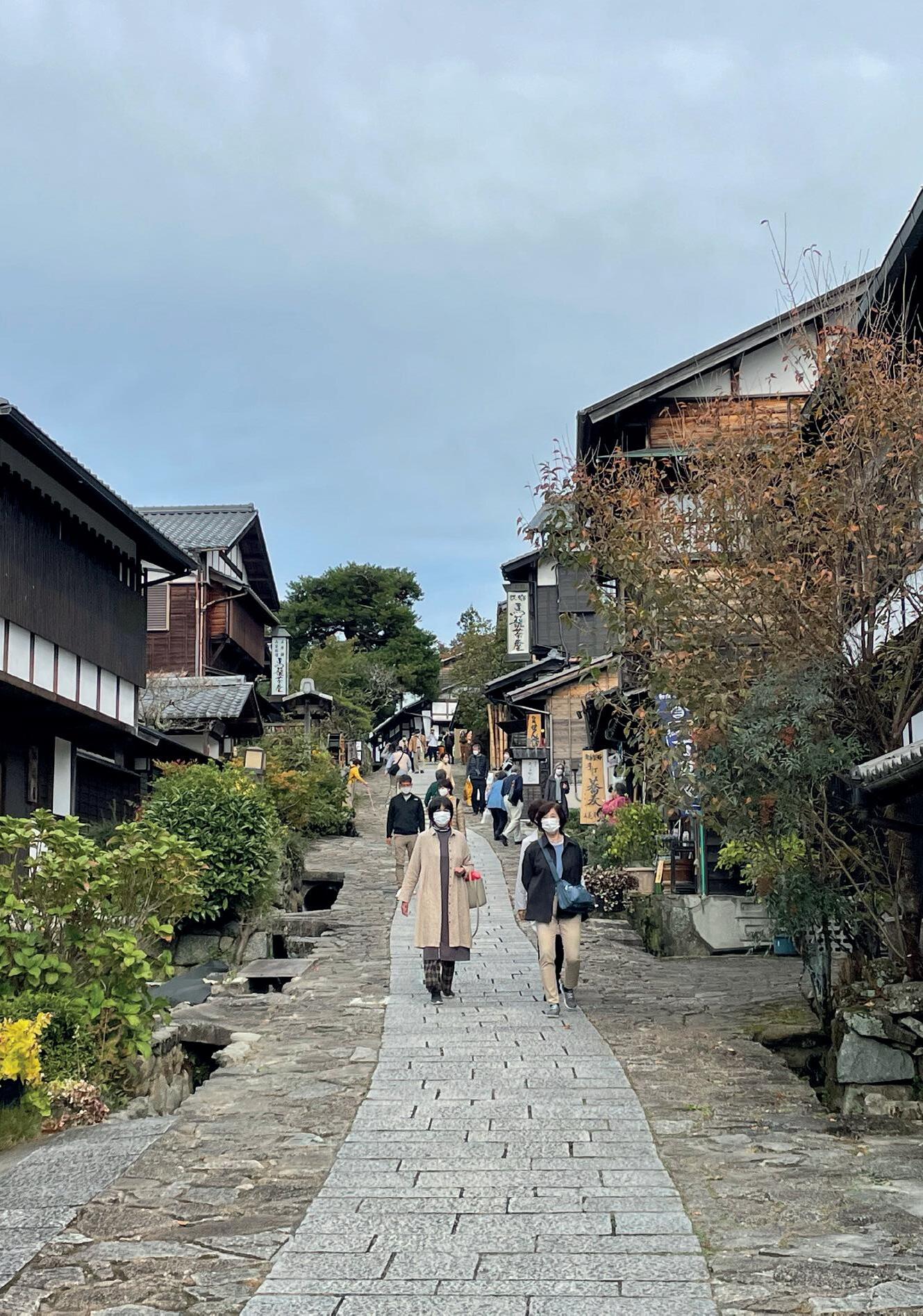
the 1600s, when Japan was ruled from Edo – now Tokyo – by the Tokugawa Shogunate, a military government. Shogun Tokugawa Iemitsu established sankin kōtai, a system which required Japan’s feudal lords, called daimyo, to live in Edo for months each year, and leave their families there when they returned to check on their lands. This required a good transport network and the Nakasendo linked Edo to the imperial capital of Kyoto. It was also a way of keeping the daimyo in check – their travel expenses left them little capital for staging a rebellion. In its heyday, the Nakasendo

Magome is one of the Nakasendo’s most polished towns. From the bus stop, a single street climbs steadily up past lovingly restored buildingsMAGOME’S STEEP MAIN STREET OUTSIDE SHINJUKU STATION, TOKYO
was plied by daimyo, servants, messengers, traders, samurai, royalty and pilgrims.
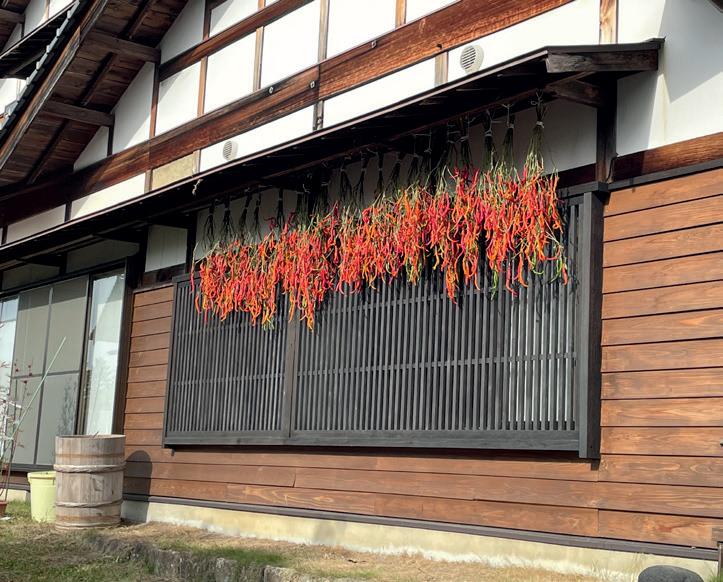


The houses thin out as we leave Magome, passing a look-out point with the Alps stretching into the distance, before the path narrows and enters forest. This stretch is popular because it’s just eight kilometres long, but we quickly lose the crowds, passing a grove of whispering bamboo before finding our first bell to warn off the black bears. Also dotted along the trail are mossy stones carved with small human figures. These are dosojin, a Shinto kami, or spirit, believed to protect travellers from evil spirits. The road winds through a hamlet of wooden houses, fronted with neat potted plants. Bunches of red chillies dry in the sun and persimmon trees hang heavy with orange fruit. As we climb
higher, the trees’ russet hues are more pronounced. We pass the entrance to a lonely Shinto shrine, its wooden torii gate peeking out among tall cedar trees. Shortly after this we cross the highest point and begin to descend, stopping at a teahouse. Run by a friendly elderly man, it’s housed in an Edo-period building, with sliding doors into a dark room where we help ourselves to green tea and sour cherries for a donation. A sunken hearth is built into a wood platform, with an iron pot hanging above it, but it’s not chilly enough to light the fire. There’s a faded picture of Joanna Lumley on the wall, taken when she visited filming a documentary. The last big attractions are the Odaki and Medaki waterfalls, which gush over boulders into clear sandy pools in the forest. From here, the fern-lined cobbled path winds down through the

trees. More houses appear as we approach Tsumago, crossing a pale blue river. At the village’s entrance is a shrine offering bottles of sake for the kami. It’s already dusk, and the warm lights of square lanterns hang from the wooden houses. Tsumago is more rustic than Magome but still beautifully preserved. Bunches of pretty dried flowers hang from windows, along with teru teru bōzu, ghost-like dolls which are a talisman to bring good weather. Many of the trees are lovingly clipped into fanciful bonsai-style shapes.
We are welcomed to Daikichi, a tiny ryokan (traditional inn) with sliding paper doors and tatami mat floors. We don’t have long to relax in our simple room before we’re summoned for dinner. Our host corrects my yukata, provided to wear for the evening. I’d hurriedly folded it right over left – usually reserved for


dressing the dead, apparently, which explains her brief look of horror. We sit opposite each other on zaisu, wooden legless chairs. Each of us has a low lacquer table which we slide our legs straight under. Dinner consists of cold soba noodles, sizzling stringy white mushrooms, trout, beef sashimi, crunchy crickets, a creamy liquid tofu, tempura vegetables and a steaming basket of red rice, with a glass of sweet cherry wine. It’s a feast, but a Japanese one – so delicately balanced and not gluttonous.
After our night walk yields no place to grab a beer, we wander back. I shuffle down the polished wooden corridor, passing the other rooms with leather slippers lined outside, and lock myself in the communal bathroom. I shower first, as instructed, before slipping into the steaming

Bunches of pretty dried flowers hang from windows, along with teru teru bōzu, ghost-like dolls which are a talisman to bring good weather


ready-poured wooden bathtub. Afterwards, I sleep like the dead. The next day brings bright sunshine and a breakfast of miso soup, fish, egg and green tea. It’s less than an hour’s walk to catch the train to Kyoto. The next town of Nagiso is more modern and sprawls along the wide Kiso River, which rushes over white boulders and is straddled by an impressive wooden suspension bridge. On the edge of town we pass a cluster of Jizo statues, stone figures dressed in tiny red bibs and wool hats – another protective deity for travellers, but Buddhist. We lunch in a charming café, with regular’s tabs hanging behind the bar and shelves of books lining the wooden walls. Cold beer and crunchy katsu curry mark an end to the walk.
Our journey ends in the imperial capital, and although Kyoto is no mega city like Tokyo, after the Kiso Valley it feels like one. As dusk falls, we join throngs of people crossing the Kamo River from modern Kyoto into Gion, the geisha district. Ahead of us two girls in flower kimonos glide elegantly. The luxurious wooden ochaya, or tea houses, along Hanamikoji Street are bathed by lamp light but windowless, offering not even a tantalising glimpse of what goes on within. The darkness and silence of Tsumago already feels like a dream, but I can imagine how those who walked the Nakasendo’s full length would have felt arriving here – sheer relief.

On the edge of town, we pass a cluster of Jizo statues, stone figures dressed in tiny red bibs and wool hats – another deity for travellers, but BuddhistKYOTO
DISCOVER SUSTAINABLE FLORIDA IN OUR DEDICATED DIGITAL SUPPLEMENT







Sitting at the edge of the Bern canton in the south of Switzerland, the Jungfrau Region is home to some of the most enigmatic names in the Alps – such towering peaks at the Mönch, Jungfrau and Eiger, and such picturesque villages as Grindelwald, Mürren and Wengen. At the gateway to the region is the town of Interlaken, set between two stunning mountain lakes Thun and Brienz. As popular in summer as it is in winter, the area is a mountain playground full of adventure.
Taking the train to the highest railway station, the Jungfraujoch, in Europe is a must. On a track built over one hundred years ago that climbs to a height of 3,454m through tunnels carved into the Eiger and Mönch mountains, the Jungfrau railway leads to quite possibly the most dramatic train station going. With views from the top as far as Germany’s Black Forest in one direction and the Aletsch Glacier in the other, the epic journey beats the 08:15 to Waterloo hands down.
Forget New Zealand’s claims to Middle Earth, the Lauterbrunnen Valley, with its steep rock faces and snowy peaks glimpsed through misty mountains, was the real inspiration for J R R Tolkien’s The Hobbit and The Lord of the Rings. Visiting the region on a hiking tour in 1911 when he was 19, the landscape has barely changed and today, visitors can follow those same walking trails. Try to count all 72 spectacular waterfalls that tumble into the lush meadows of flowers beneath!
TRÜMMELBACH
The world’s only glacial waterfalls that are accessible underground by lift, galleries, tunnels, paths and platforms, the Trümmelbach Falls are a collection of 10 cascades fed by the enormous glacial walls of the Eiger, Mönch and Jungfrau.

MÜRREN

Set on a sun trap of a plateau above the Lauterbrunnen Valley, the little village of Mürren is car-free and picture perfect. Surrounded by gentle hiking trails through the hills, get a view of it all from the Schilthorn.

GELMERBAHN
You won’t miss a moment of the view on this funicular, the Gelmerbahn, as it travels backwards up the mountain.
The steepest open funicular in Europe, it takes you up to Lake Gelmer at an altitude of 1,850m.
Standing high above the village of Grindelwald is First, a mountain famed locally for its hiking trails and adventurous activities. Board the gondola in the village, then take your pick from two flying fox zip wires (reaching speeds of 80km/h), a suspension bridge on the First Cliff Walk and a ride on a nimble mountain cart. Catch your breath at Lake Bachalpsee, a gentle hour’s walk from First and known as the ‘Blue Jewel’ of the Alps.
Oozing traditional Alpine charm – think wooden chalets with sloping roofs, window boxes filled with bright flowers and carfree streets – the village of Wengen is accessed by cogwheel train from Lauterbrunnen. While it’s famed for hosting the renowned Lauberhorn World Cup Downhill ski race in winter, aside from that terrifyingly fast race the slopes, shared with neighbouring Grindelwald, are gentle and flattering. In summer, that same terrain makes for pretty walks through flower-strewn meadows.
A new cable car, the Eiger Express, takes just 15 mins to travel from Grindelwald to the Eiger Glacier station



Within this small region two literary legends have made their mark. That most Victorian of detectives Sherlock Holmes tragically died in the thundering waters of the Reichenbach Waterfall, near Meiringen. Holmes’ creator, Arthur Conan Doyle, visited in 1892 and decided it would be a worthy tomb for his super sleuth. And up on the Schilthorn above Mürren you’ll find James Bond – On Her Majesty’s Secret Service was filmed in Piz Gloria, a 360º revolving restaurant on the peak’s summit.

How do you see all that Australia has to offer on one trip, when it’s so vast? Visit Queensland – it’s got rainforest, ocean, outback and city, all in one handy state

Words Ally Ware

Australia is big. Really big. It’s about 32 times bigger than the United Kingdom, and has a wealth of incredible landscapes, cultures and wildlife to boot. So when you start planning your next trip there you wouldn’t be the first person to think you’ll need to spend months in the country to see it all.
If you plan to see the whole country, then months would be ideal. But if time only allows for weeks then may I suggest visiting Queensland? The state offers travellers the rare opportunity to explore the bustling cities, beautiful beaches, colourful reefs, tropical rainforests and the red sands of the outback – all within a relatively short trip. I had a week spare for my adventure, determined to take in as much as I could of this beautiful location and immerse myself in the country in a short space of time, taking advantage of the relatively
close proximity of Queensland’s varied landscapes. Certainly not enough time, I’d absolutely encourage you to take at least two to three weeks to explore properly.

Starting on the Gold Coast, spend the day soaking up the wide sandy beaches of Surfers Paradise. For a literal breath of fresh air after a long flight, watch experienced surfers working the waves, friends strolling with coffees and fitness enthusiasts enjoying the expansive boardwalk – it’s the perfect showcase for the laid-back lifestyle Australia is so famous for.
In the evening head to one of the many bars and restaurants to enjoy local cuisine. Take your pick from fresh fish and seafood, or try a kangaroo steak if you’re feeling adventurous! A short flight or a 19-hour drive up the coast takes you to Mission Beach. This off-the-beaten track town boasts palm-
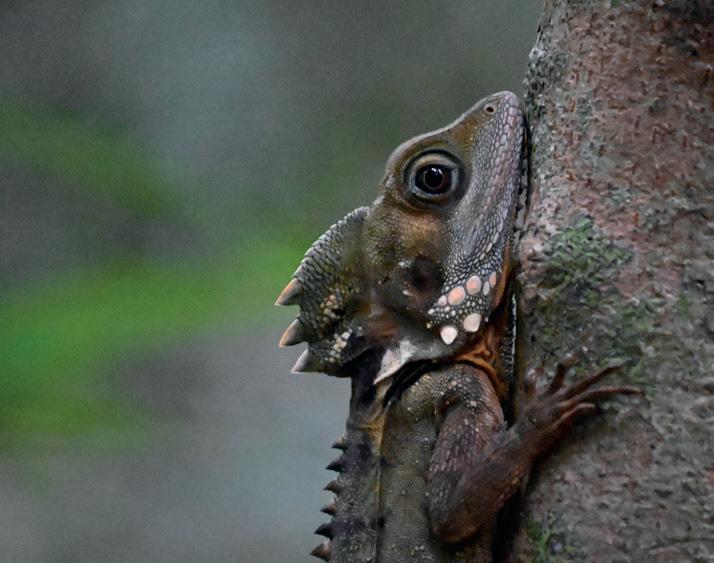
Head up to the top of the Q1 Tower in Surfers Paradise, and enjoy breakfast or a coffee with incredible views from the observation deck

fringed beaches, relaxed cafes, opportunities to spot wild Cassowaries and also provides a gateway to the Great Barrier Reef. A day trip to the Reef is sure to inspire you to protect this incredible spot, watching the soft corals flowing with the current of the ocean, as tiny glittering fish reflect the sunlight on to their larger, more colourful counterparts. Be sure to book with a sustainably-certified operator and the on-board team will make sure you’re fully briefed to swim safely on the reef, causing no damage and taking with you only memories.
From Mission Beach we drive inland, towards the Atherton Tablelands. En route, we stop at Paronella Park to marvel at the Spanish-inspired buildings, the vintage hydroelectric generator and waterfalls. Created by José Paronella between 1929 and 1935, it’s a beautiful pleasure garden and

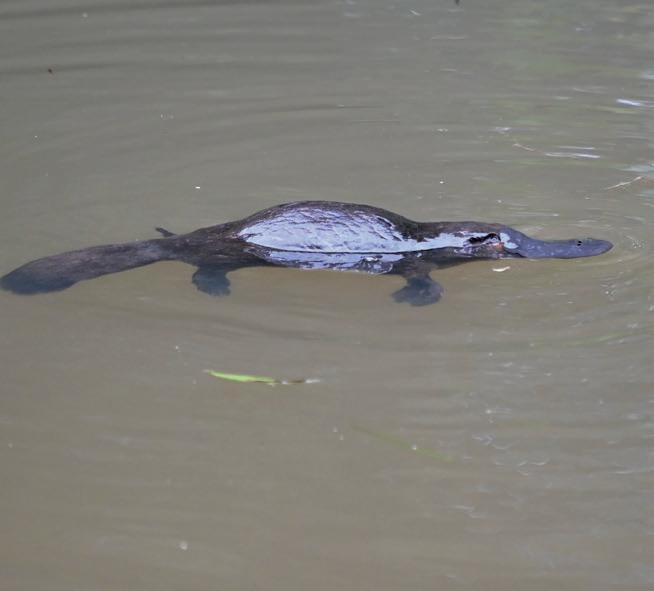
reception centre built for the enjoyment of the public.
From here head to the Mamu Tropical Skywalk, half an hour away, and spend an hour climbing on cantilevered boardwalks among the rainforest canopies, exploring the rainforest from a new perspective and even spotting some creepy crawlies along the way!

Climb the Observation
Tower for impressive views over the Atherton Tablelands, though take a deep breath and steel yourself before climbing back down! For a real rainforest experience, check into Rose Gums Wilderness Retreat for the night. Each of the treehouse rooms has a veranda set on stilts that looks out over the rainforest canopy – enjoy a drink on your deck as you watch the sunset
over the valley and listen to the forest come alive at night. A real must is to get out on a wildlife tour. Be sure to book with a passionate wildlife expert at one of the leading nature tour operators, which Charitable Travel can arrange, and you could spot platypus, Boyd’s forest dragons, an abundance of bird life and even tree kangaroos. They’re all there – you’ve just got to know where to look.
For your first taste of the Australian Outback, set off on the three and a half hour drive

Drop in at Mungalli Creek Bio-Dynamic Dairy at Millaa Millaa to sample its delicious lactose-free dairy products and perhaps share one of its ploughman’sgenerous boards for lunch

Unspoiled beaches to the east, stunning marshes to the west, island charms everywhere in between

At the Mamu Tropical Skywalk, climb on cantilevered boardwalks among the rainforest canopies, exploring the rainforest from a new perspective

inland towards Talaroo Hot Springs. The further you drive, the sparser the trees become and the redder the earth appears. This is where things get really wild. As you drive you may see a mob of wallabies hopping among the trees, almost keeping pace with the car – or you may even see snakes basking in the sunshine on the road side.
Take a soak in the healing waters at Talaroo before your onward journey, and you’ll leave feeling super relaxed and at one with nature and country
Arriving at Talaroo Hot Springs is like stepping on to another planet. Set in the heart of Gulf Savannah country, Talaroo’s surreal landscape of pools and terraces, vivid colours and diverse formations unite one of outback Queensland’s most extraordinary geological wonders with the Aboriginal hospitality of the
Ewamian people. Learn about the history, people and culture on a walking tour of Talaroo, which even includes the chance to soak your feet in one of the hot springs.
Make your way to the Undara Volcanic National Park for another out of this world experience, watching iconic Australian wildlife, such as kangaroos, colourful cockatoos, lorikeets and other truly wild creatures, in their natural environment. Take a guided tour through the Undara Lava Tubes – an underground cave system formed by ancient volcanic activity – learning all about the incredible environmental, geological and historical features of the region. Enjoy a big sky sunset as you sip sparkling wine and cheese while your Savannah guide unlocks the secrets of this timeless land.

At dusk, make your way to the entrance of a lava tube for a nature experience you’ll never forget! Thousands of tiny insecteating microbats emerge from the darkness to find food, which in turn attract pythons and brown tree snakes that hang down from the trees, striking out at the bats for dinner.





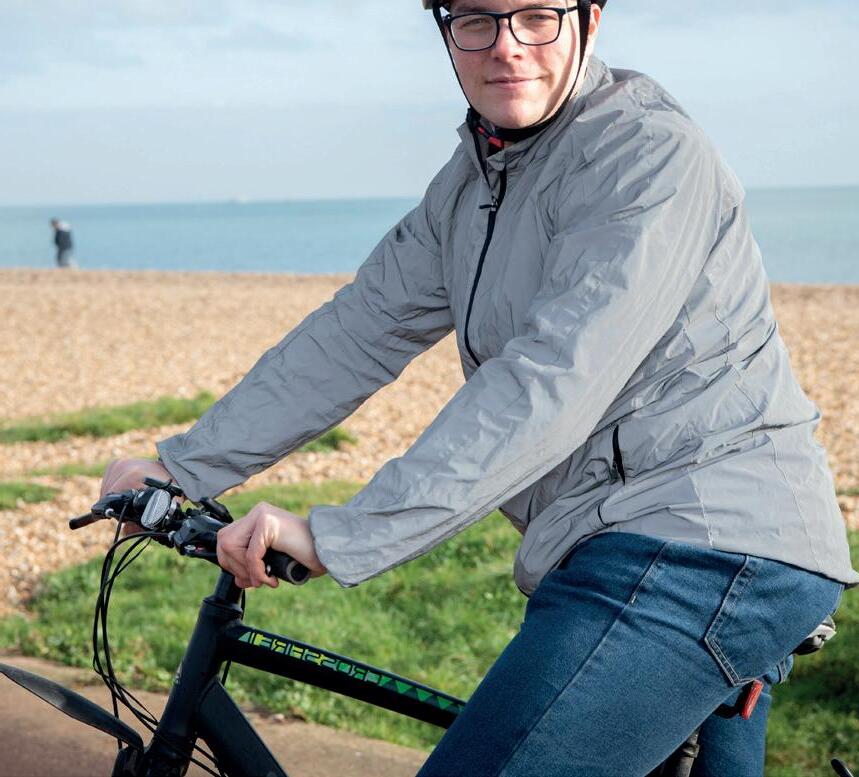
As the rugged wilderness of the outback fades in the rear-view mirror, the landscape becomes greener and you begin to breathe the fresh ocean air you’ll know the excitement of your trip isn’t over yet. Arrive in Cairns and check into an ocean-front hotel, absorbing

the striking views before heading out for a stroll along the esplanade. Perhaps stop for a refreshing swim at the open air pool, sip a cocktail at a bar overlooking the ocean or pick up an ice cream from one of the many gelaterias.
Finally, see out the week with an afternoon of adventure! Cairns is home to a host of adventurous activities, but for my entry-level adventure I went river-tubing. Lying back on a huge inflatable doughnut to float down the river, I watched as the sunlight came through the canopy creating beautiful dappled light and let the enormity of everything I’d seen over the past week sink in. Just remember to sit up for the ‘rapids’!

Low Carbon travel ideas
Local Seasonal Food Stories and Inspiration
Learn about rewilding in the UK
Positive Impact Tourism around the world
New from the Charitable Traveller Publishing Group, Green Traveller Magazine covers flight-free holidays ("less carbon, more fun!") and positive impact adventures that contribute to biodiversity conservation, regeneration, and local community empowerment.
SUBSCRIBE FOR YOUR FREE COPY

Finding a greener way to holiday is fast becoming popular for travellers looking to explore the world more carbon-consciously, but how do you it? Richard Hammond, editor of our Green Traveller magazine launching this summer, explains
Eco, ethical, responsible, sustainable; whatever it’s called, for me it’s about travelling in a way that’s sensitive to the climate and nature emergencies, while ensuring that the wellbeing of the places we visit gain long-term benefit from us travelling there. It’s a balancing act between reducing or eliminating the negatives and maximising the positives of travel.
The world is about one degree Celsius warmer than before widespread industrialisation in the late 19th century, and it is thought that a further temperature rise (even to just 1.5 degrees), caused by greenhouse gases, such as carbon dioxide, is the gateway to dangerous warming. Furthermore, one million animal and plant species worldwide are threatened with extinction due to a variety of threats, including the intensification of agriculture and forestry, resource extraction, pollution, and climate change.
Being a greener traveller is a state of mind that applies to all aspects of how we travel, from choosing what to pack
in our luggage and how we travel to the destination, to our choice of hotels, tour operators and activities. Just as the ‘slow food’ movement is all about savouring the taste of food, so green travel is about savouring the journey, relishing local food, and appreciating different cultures while cherishing those spontaneous moments away from home with friends, family and others that make holidays so special.
Travelling to and from a holiday is often responsible for the lion’s share of the carbon emissions of the entire trip. Many forms of motorised longdistance transport burn fossil fuels, so the most effective way to reduce those emissions is to reduce how far you travel, choose alternatives to petrol or diesel-fuelled vehicles, or travel on foot, by bike or under sail.
An increasing number of hoteliers are now going to great lengths to reduce the impact of their business on the environment, reduce or even eliminate their carbon emissions, maximise the conservation of local biodiversity, and play a contributing role in safeguarding the culture and livelihoods of their local

communities. It may seem trivial, but reporting back about how green they are on review sites and on social media can provide invaluable information to help other travellers make more informed choices.
Keep an eye out for initiatives that support wildlife conservation. In the UK, The Wildlife Trusts are a federation of 46 independent wildlife conservation charities covering the whole of the UK. They provide a range of ways to can get involved in local conservation efforts, from volunteering to fundraising.
Further afield, there are now plenty of positive-impact holidays overseas that support regenerative projects, which aid nature conservation, socio-economic work and humanitarian aid.
I look forward to shining a light on many ways you can go green in our forthcoming online publication, Green Traveller magazine; the first issue is out in August. And for help booking a greener holiday, speak to the team at Charitable Travel.
Next issue: How to spot the green from the greenwash
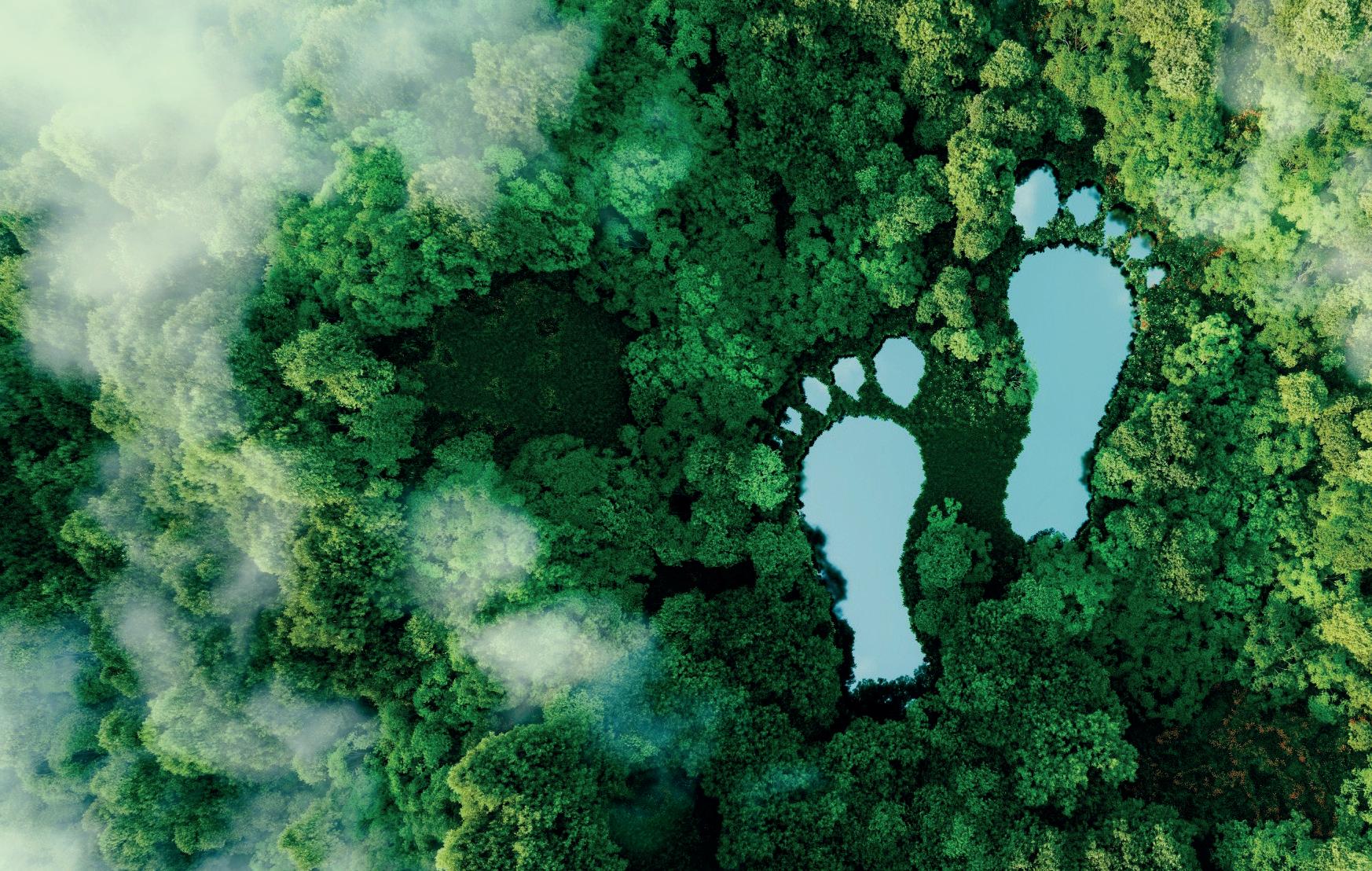
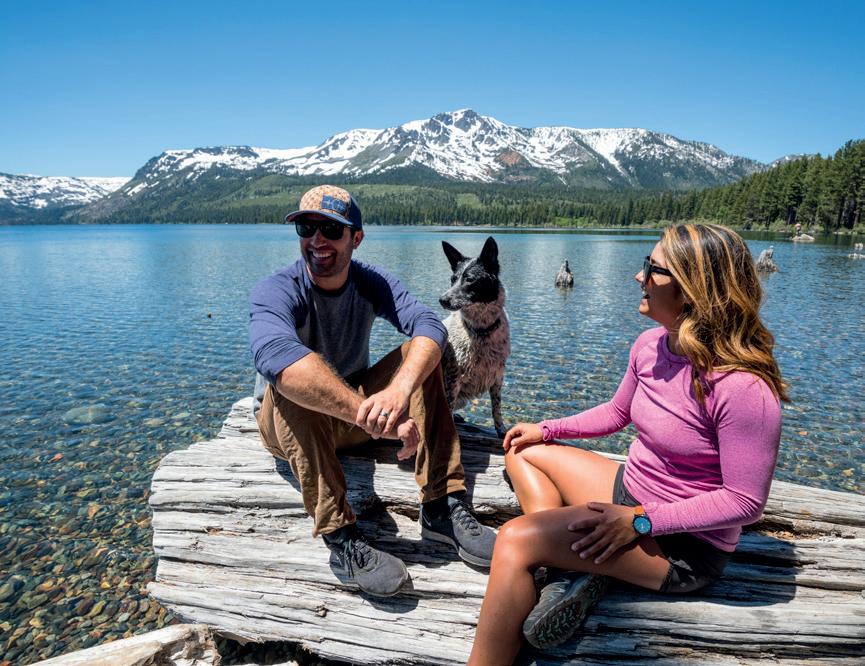

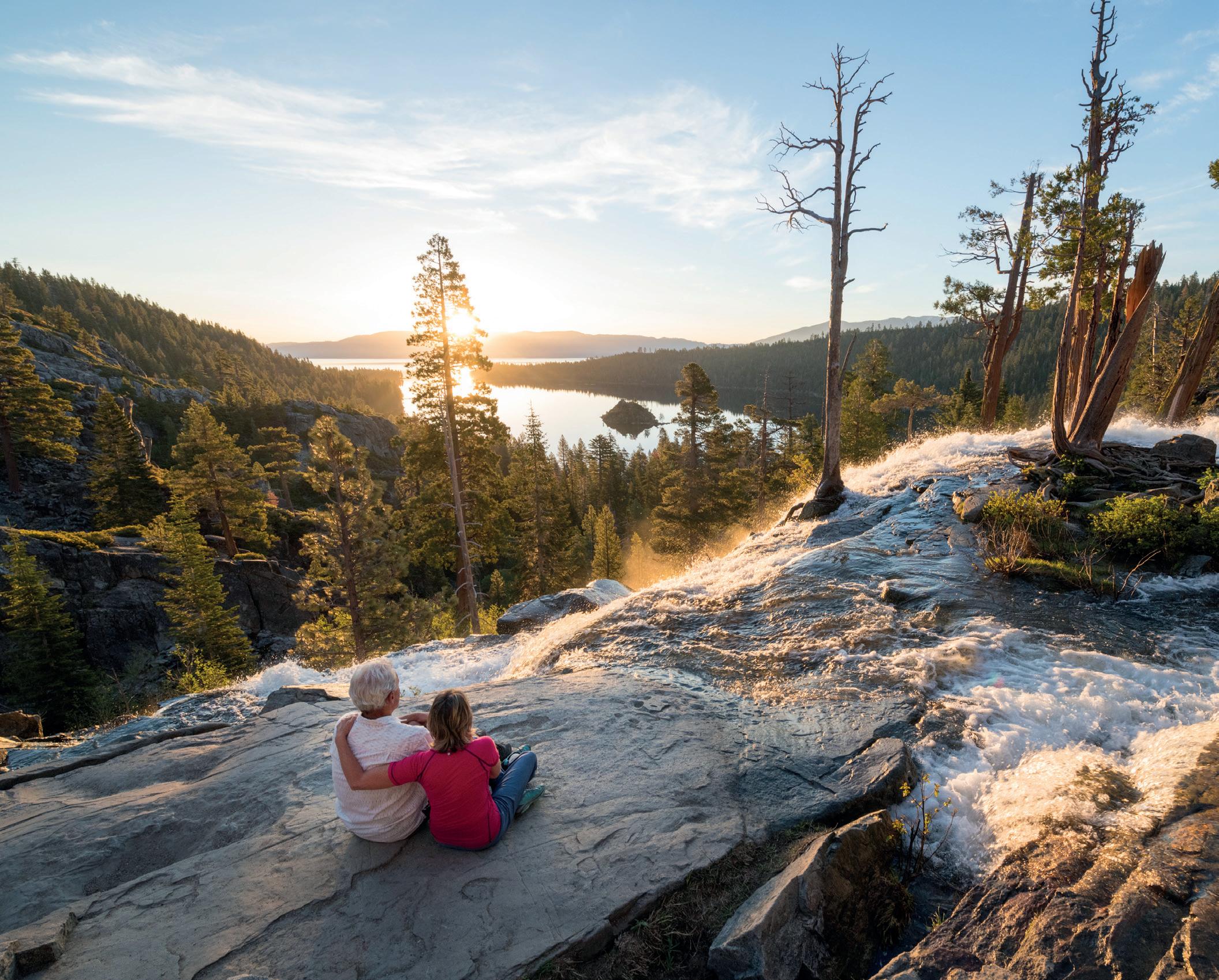

South Lake Tahoe is a nature lover’s paradise in California. From the crystal-clear waters of the Lake to the towering peaks of the Sierra Nevada Mountains, breathtaking scenery surrounds you. Go hiking along the Tahoe Rim Trail, rent a kayak to paddle across the serene waters, or simply relax on the sandy beaches. The natural beauty here will leave you in awe.

For the adventurous souls, South Lake Tahoe offers an array of exciting activities. Embark on a thrilling hike through the Desolation Wilderness, or conquer the exhilarating mountain bike trails at Corral Loop. For those craving an adventure on the lake, kayaking and paddleboarding on the pristine water are must-try experiences. Indulge in rock climbing, horseback riding, or even paragliding for an adrenaline rush. No matter your skill level, the adventures here will push your boundaries and create lifelong memories.
When winter arrives, South Lake Tahoe transforms into a snow-filled wonderland. Hit the slopes at world-class ski resorts such as Heavenly Mountain Resort and Kirkwood Mountain Resort or strap on some snowshoes for a peaceful trek through the snow-covered forests; experience the thrill of snowmobiling through picturesque snowy landscapes or lace up your ice skates for a spin on the ice. The snowy season in South Lake Tahoe is a playground for winter enthusiasts.

Escape the hustle and bustle of everyday life and find tranquility in South Lake Tahoe. Whether you choose to take a leisurely walk along the shores of the lake, absorbing the serene atmosphere, pamper yourself at one of the luxurious spas offering rejuvenating treatments and massages or do some yoga or meditation amid the serene natural surroundings, South Lake Tahoe provides the perfect backdrop for relaxation and self-care.


Delve into the rich cultural and historical heritage of South Lake Tahoe. Visit the Vikingsholm Castle, a marvel of Scandinavian architecture, or explore the Taylor Creek Visitor Center to learn about the area’s wildlife and ecology. Discover the captivating exhibits at the Lake Tahoe Historical Society Museum or catch a performance at the historic Valhalla Tahoe. Immerse yourself in the region, both its past and present.

South Lake Tahoe is a paradise for anyone looking to enjoy an adventure on the water. Dive into the pristine waters for awesome activities like jet skiing, wakeboarding, and tubing. Rent a boat or join a guided tour to explore the vastness of the lake, stopping to swim and sunbathe in secluded coves. Fishing lovers can cast their lines in search of trout, salmon, or bass. Whether you’re seeking heart-pumping thrills or leisurely water adventures, South Lake Tahoe offers an abundance of aquatic experiences to suit every preference. The sparkling blue water and breathtaking scenery make any adventure a worthwhile one.
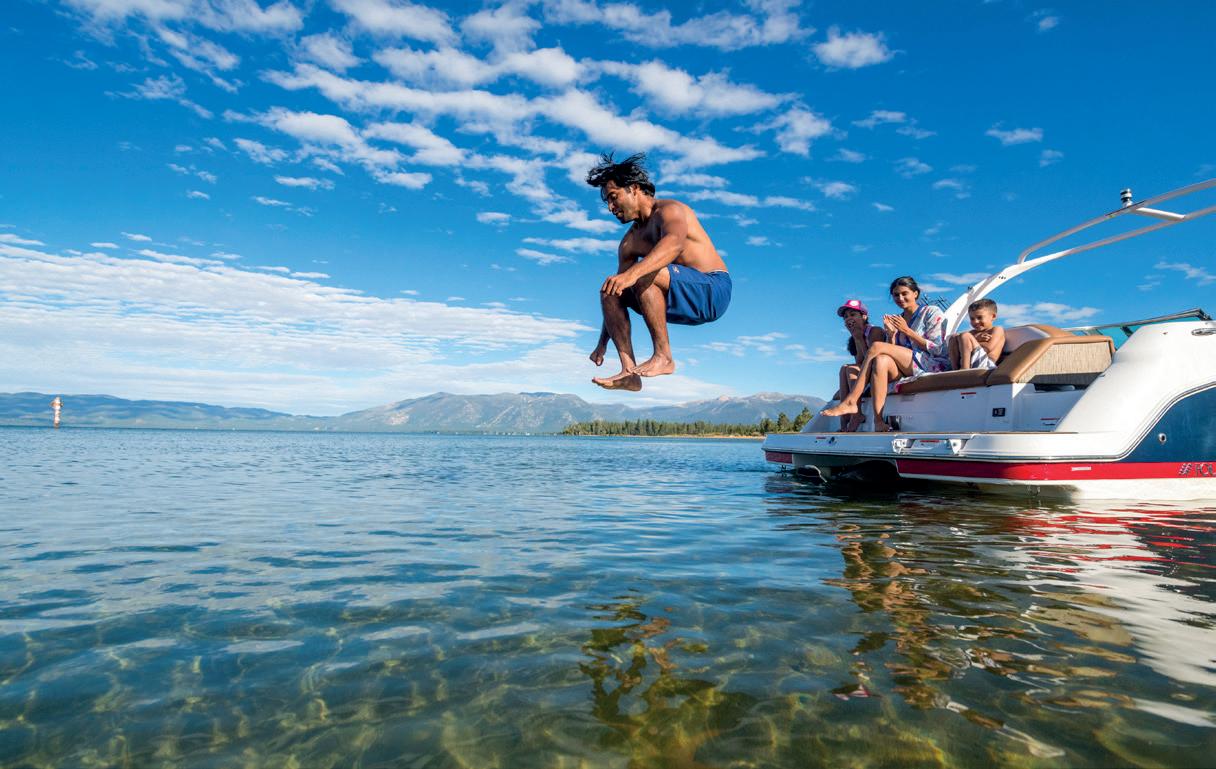

Indulge your taste buds with some exquisite lakefront dining experiences in South Lake Tahoe. From cozy cafes to upscale restaurants, enjoy fresh and delectable dishes while soaking up incredible views of the lake. After a satisfying meal, try your luck at one of the renowned casinos or enjoy live entertainment at a buzzing venue. South Lake Tahoe’s vibrant nightlife offers something for everyone, ensuring an unforgettable evening.

South Lake Tahoe: A captivating destination where azure waters meet majestic mountains, offering thrilling adventures, serene moments, and an enchanting escape into nature’s embraceBOATHOUSE ON THE PIER
Lodges, camps and resorts in the Middle East are making great strides in sustainability that honours their unique ecosystems. Charitable Travel’s Ali Nichols rounds up 8 of the best


Located half an hour from Salalah city centre, the Souly Ecolodge is on the peaceful, spectacular shores of the Indian Ocean (Oman Gulf) next to a freshwater creek called Khour Souly, a favourite hangout for some of the local wildlife. Originally set up with just a handful of Bedouin tents, the property now has 21 spacious wooden bungalows, all en suite and with verandas to enjoy the stunning sunsets from. Built using local materials from the nearby area, Souly Ecolodge uses solar power as much as possible. At Souly’s welcoming campfire area with Bedouin tents, tuck into delicious food and drink while listening to local live music and soaking up Oman’s perfect starry nights.
On the outskirts of Abu Dhabi, the world’s largest sand desert – the Empty Quarter –beckons. Qasr Al Sarab by Anantara rises up from flamecoloured dunes like a mirage, inviting adventure in the most luxurious of styles. Sustainability is at the forefront of the resort’s philosophy as it aims to be the greenest desert resort in the world and has launched a list of sustainable initiatives that build upon its broad platform of existing energy and carbon-saving practices. And later in 2023, guests will be able to combine this with a stay at the beach at Anantara Mina Al Arab in Ras al Khaimah, a perfect combination of different experiences.

Six Senses Zighy Bay prides itself on both caring for the environment and looking after the local community, as well as promoting Oman’s rich cultural heritage. Since opening, the resort has involved hosts, villagers and their guests in numerous activities, including tree planting, enabling access to education for women and regular ocean and beach cleanups. As much as possible is sourced locally and the chefs are often to be found at the Dibba fish market at dawn, providing a living to locals and unparalleled freshness to what’s on your plate, or in the on-site organic garden, picking the freshest farm-tofork vegetables and fruit.

Set on an island off the east coast of Sharjah, Mysk Kingfisher Retreat is a haven of conservation. Birds, gazelles, turtles and crabs live among its mangroves, and the island has a working conservation centre. With exclusive access to this pristine ecosystem, the retreat provides an insight into a unique world of conservation and culture, and each of the 20 tented suites have views overlooking the Indian Ocean. While here, try the ancient craft of archery at the range, take a guided nature walk, or jump on the fat bikes provided for each suite to explore this globally important wetland.


Set among the UAE’s first national park, the Al Haha Desert Resort & Spa offers unparalleled access to the Dubai Desert Conservation Reserve. Created for the protection of endangered species and for the conservation of the natural desert habitat and heritage, a full-time team of researchers from the resort monitor the reserve to ensure the future of many of the indigenous species of Arabia. For guests, it’s a chance to take in the secluded tranquility and iconic vistas of the sweeping plains and Hajar Mountain massif, and take a horse ride, nature walk or desert safari among this unique landscape.

A luxurious glamping resort set in the Wadi Rum desert (of Lawrence of Arabia fame), Discovery Bedu blends seamlessly into the spectacular landscape without compromising on comfort. Spacious tents with proper bathrooms and giant beds welcome guests, who are nourished with food from the tented kitchen where chefs in tune with Mother Nature prepare mouth-watering authentic meals infused with different herbs and spices to stimulate your senses. The main dining area is in the Bedouin tent, or dine al fresco under the canopy of the stars. Breakfast is served on a sandstone hill by the camp, overlooking the stunning landscape and mountains.


Sitting 2,000 metres above sea level, Alila Jabal Akhdar is both a peaceful sanctuary surrounded by never ending views of the surrounding Al Hajar Mountains and a departure point to the incredible history and culture of Oman. Inspired by that ancient history, contemporary villas and suites built using locally sourced materials and classic-style stonework offer the luxury of indoor-outdoor living. Attracting both adventure enthusiasts and history and culture buffs, it’s a treasure trove of rich experiences.
Step into an enchanting world of authentic Bedouin hospitality and natural beauty deep in the heart of the mountainous Dana Biosphere Reserve at the award-winning, solar powered Feynan Ecolodge. It’s the most developed eco-experience in Jordan, and is only made possible by a unique partnership with the Royal Society for the Conservation of Nature, a Jordanian NGO devoted to the protection of the Kingdom’s finest natural landscapes. Here, guests can unwind in the serene courtyards and terraces, or adventure through the untouched outdoors, sip sweet tea with the native Bedouin, and explore local archaeological sites, safe in the knowledge that their travels in Jordan are socially and environmentally responsible.



The children’s charity of rugby, Wooden Spoon is a grantmaking organisation that funds life-changing projects across the UK and Ireland to transform the lives of vulnerable children and young people. Founded after England’s dismal performance in the 1983 Five Nations Rugby Championship, it works with rugby clubs and fans to fund approximately 70 projects a year, including creating playgrounds and providing outdoor activities, supplying specialist kit and facilities, and building sensory rooms and gardens for children and young people with learning disabilities. woodenspoon.org.uk
Building libraries and learning centres in Kenya is more than just providing books to children and adults alike.

Our libraries are community managed, to help foster a sense of collective ownership and to improve literacy across all ages.
Help us to inspire children and empower adults.
charitable.travel/just-be-a-child

With the Rugby World Cup – the pinnacle of the men’s rugby union game – kicking off in France in September, we’re taking a look at the charities and foundations that use the sport as a force for good to support those in need
Founded by former England and Leicester Tigers rugby player Matt Hampson OBE, the Matt Hampson Foundation works to inspire and support young people seriously injured through sport. Matt experienced a life-changing injury in 2005 that left him paralysed from the neck down, aged 20, so understands the journey injury leads to. By providing expert physiotherapy, specialist personal training, support, mentoring and advice, the Foundation helps people with lifechanging injuries to get busy living again, whether it’s helping them get back into sport, or supporting them in adapting to their new life. charitable.travel/the-matt-hampson-foundation
Founded and led by Rugby World Cup Champion Jason Leonard OBE, the Atlas Foundation exists to help deprived children work towards a better future through rugby communities. Through health, education, and gender inclusion programmes plus a large number of rugby initiatives, The Atlas Foundation provides safety, education, food, sport, guidance and community to thousands of children across five continents. Its work is led by the core rugby values of integrity, hard work and respect, and so far, over 50,000 children have been supported. theatlascharity.org

Providing financial and personal support to servicemen and women to help them make the transition from military service back into civilian life, Rugby For Heroes uses the sport of rugby to assist with the process. There are some obvious parallels to be drawn between the UK’s Armed Forces and rugby (namely the traditions and shared core values), and the rugby community offers a sense of belonging that many leaving the Armed Forces recognise and relate to. rugbyforheroes.org.uk
Committed to helping improve the lives of those affected by Motor Neurone Disease, the foundation was created by the late Doddie Weir OBE, one of rugby’s most recognisable personalities who earned 61 caps for Scotland during his career and, in 2017, revealed he was suffering from Motor Neurone Disease. The Foundation helps fund grants given by MND Scotland and MND Association, and initiates and encourages research to better understand the needs of MND patients and their families. myname5doddie.co.uk
Tiggywinkles is the busiest hospital in the World, treating over 13,000 sick, injured or orphaned British wild animals each year.








Our doors are open 24/7 to offer ground-breaking, specialist veterinary treatment.

The new plastic-free playground at Alnwick Garden in Northumberland provides a perfect excuse to visit England’s most northern county, says Girl
About Ambassador Beth WardellIn the heart of Northumberland, something magical is happening. A fantasy home of fairies, elves and hobgoblins – otherwise known as the world’s largest play structure – has opened, 12 years after it was initially dreamt up, and I’m not the only one who’s loving the escapism it provides.
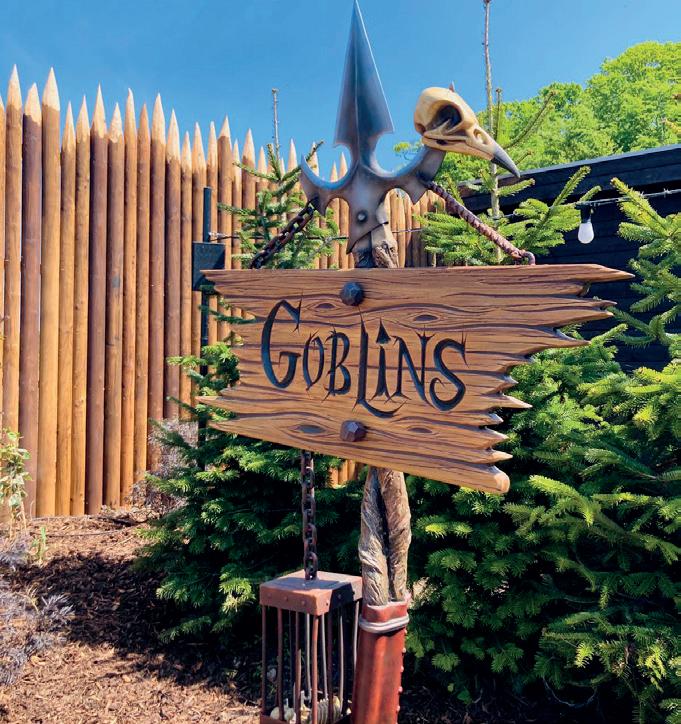
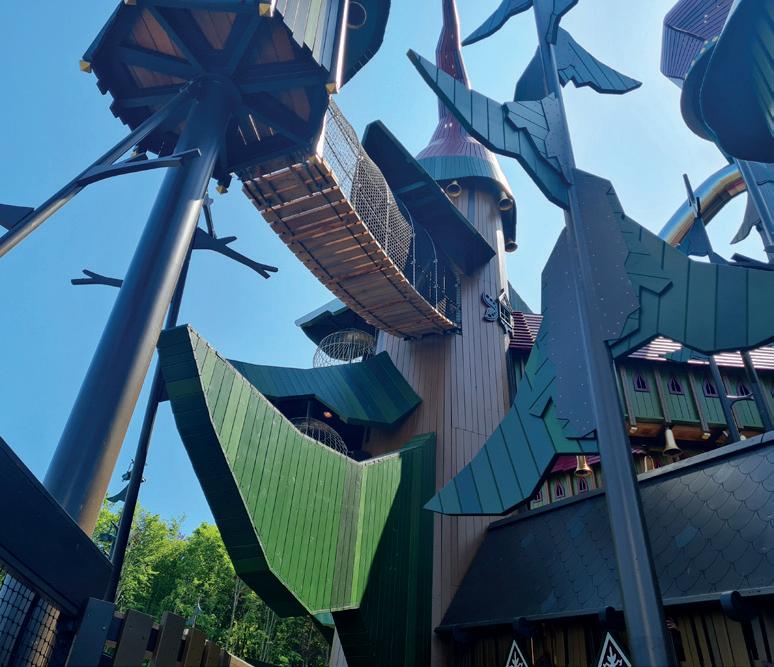

In England’s most northern county, you’ll find the quaint market town of Alnwick. Finding fame in the early 2000s after Alnwick Castle was used as the setting for Hogwarts School of Witchcraft and Wizardry in the first two Harry Potter films, this small town welcomes tourists from around the world. And now, visitors have another reason to descend on this corner of the north east… Lilidorei. Lilidorei at The Alnwick Garden is home to Elfwin Drin, Lord Elfwin’s grand castle – an enchanted playground of huge slides, zip lines and climbing walls spread across 10 towers. Standing at an impressive 24m tall (six metres taller than the Angel of the North and the same height as an eight-storey building), the structure has been imaginatively designed to include six slides, a fireman’s pole, swings, tunnels and suspended cages. In keeping with its woodland surroundings, it’s all made from larch wood with not a piece of plastic in sight. So
much more than just a playground for children, adults are also encouraged to explore and whizz down the super fast slides too. There are nine clans who reside at Lilidorei and as I wander round the village with its small earthy wooden houses, I feel like I’m in a fairy tale where the outside world doesn’t matter. The clan houses are brought to life with immersive lighting, a state of the art soundscape experience and interactive storytelling. Visitors are invited to look through the windows of each house to see how the clan members live. From friendly fairies to fiendish goblins, your imagination will know no bounds as you find yourself enchanted, spooked and captivated as you wander through the woodland. Which, by the way, is made up entirely of Christmas trees and includes a golden speckled floor, which will look completely magical in the winter months when all the lights are on.
Lilidorei is the creative vision of Jane Percy, Duchess of Northumberland, whose family have lived in Alnwick Castle for over 700 years. She hopes it will encourage little ones’ imagination to run wild with endless screen-
free play and provide the ultimate escape from 21st century life.
“Lilidorei has lived in my imagination for the past 12 years and I am delighted to bring my creative vision to life,” said the Duchess. “We want to encourage children away from screens and into this magical giant playground where their imaginations can run wild. Our ambition is for Lilidorei to be accessible to all children regardless of their background, which is why we have committed to Free Fridays, ensuring that every schoolchild in Northumberland and the surrounding areas has the chance to visit the attraction for free during

Girl About Travel is a unique online platform created by travel industry experts – a journalist and a tourism marketing and comms specialist –and provides content for women who want to make amazing memories with their loved ones, either in the UK or overseas. A trusted partner of Charitable Travel, Girl About Travel’s content is created by a network of female writers, AKA the Girl About Blog Squad – the official Girl Abouts in their cities and counties. Follow them on charitable.travel/girl-Instagram. about

their primary years’ education.”
Tomas Lau Knudsen, the lead designer at Monstrum, the Danish design and architect firm who built the park, said, “At Lilidorei you should simply expect to see something magical that would blow your mind and that is out of this world, taller and bigger than anything you have ever experienced before.”
Behind the immersive experience of magical storytelling and imagination that’s built into all the action-packed adventure, there is a dedicated charity that works to support those that need it most.
Lilidorei is operated by The Alnwick
Garden Trust – an independent charity funded by admissions from both Lilidorei and The Alnwick Garden – that works to support those in the local community who need it most.
Lilidorei is well worth making a trip for, and if you’re travelling from further afield, I recommend staying at Fenton Hill Farm cottages, in the nearby village of Wooler. To get a real taste of Northumbria you’ll want to explore the area as much as possible and these cottages, situated near the Cheviot Hills, make a comfy base with breath-taking views, for doing just that.
“At Lilidorei you should simply expect to see something magical that would blow your mind and that is out of this world”
ResiRest provides the opportunity to travellers to share a meal together at the table of a local family. It works as a facilitator between all those local families and communities in the world who want to share their local culture, with the travel organisations that supply their customers with that true local culture.
ResiRest is my dream of travel being a force for good for local families and their communities, turned into reality. We provide international travellers with the chance to sit down for a meal at the table of a local family via our network of global travel partners. With our platform, we support local families and their communities, and we’re proud to say ResiRest is the only travel organisation in the world with fullmember accreditation of the World Fair Trade Organisation.
I was traveling in Senegal for several months in 2015, when I realised that I’d connected approximately 30 parties (backpackers, families, couples etc) with local families I’d met, and organised the chance for them to share a meal. By doing so, I was often asked a lot of questions, including, ‘How do you do that?’ ‘How much do I have to pay?’ ‘Is the food okay?’ ‘Is the water okay?’ ‘Isn’t it dangerous?’ ‘What can I eat and what should I avoid?’

From that came a plan to start a business directly impacting local families that otherwise would not be seen and experienced by travellers. It’s important to understand that a lot of locals see travellers, yet it’s quite impossible for them to connect.
On the other hand, travellers can sometimes be seen simply as
‘wallets’, or the food can be bad. So, having plenty of families to share a meal with, knowing that all these families are checked on general safety and food safety, and that the prices are fair trade is what ResiRest is all about.

We create chances and opportunities for local families, who are beautiful as they are, to share their culture and cuisine with travellers who want to step out of their travel bubble. In so doing, we help create self-reliance for local families that has a big impact on their self esteem.
This in turn helps restore pride, and when you’re proud of what you are doing, you don’t need to change and that ensures authenticity, which makes the guests of local families so enthusiastic. We see travellers adapting to the local families and you know what? They love it!

Geert Kroos set up ResiRest, a Dutch social enterprise, to connect local home cooks with travellers who want a taste of their culture. Here, he explains how it all works
We always work on a demandsupply basis, as it’s the only logical way to work with communities. At ResiRest we say, ‘Local families do not work for ResiRest; ResiRest works for the local families.’ Same words, but completely different sentence and outcome. It ensures a certain monthly income for families, while making sure there aren’t too many bookings, as this can create a loss in authenticity and too much dependency on tourism.
We’d like to see some changes to how travel businesses work with DMOs and DMCs (destination management organisations and companies). They’re large commercial tourism machines and aren’t equipped to make small experiences a success.
We work for a lot of local families in Cambodia, in the rural area just outside Krong Siem Reap.
Find out more about Resirest and how it connects travellers and locals through food experiences at resirest.com
These families were ignored within their communities but now that they welcome travellers, they’re seen as respected community members! We’ve also helped some people work less hours with extra income, so they can be around for their young children.

Surviving the pandemic, but we got through it and are now ready to receive more bookings for the local
families we work for in almost 50 countries around the world.

Next is ‘A Change of Scenery’, local experiences that aren’t food-focussed but instead allow travellers to enjoy the local culture in many different ways. We’ve created the support system so the whole thing is safe, Fair Trade, and easily bookable.
As a country of short distances, you can easily discover the varied landscapes of Luxembourg’s capital and five regions. With lots of Leading Quality Trails, certified as ’Best of Europe’ by the European Ramblers Association, routes are diverse in terrain and in accessibility, with steep climbs and rocky paths for hiking enthusiasts, engaging circuits for families, and attractive routes for people with impaired mobility.

Once one of Europe’s mightiest fortresses, Luxembourg’s capital is now a wonderful fusion of tradition and modernity. Wander along the Chemin de la Corniche, down the cobbled streets towards the Grund old town, through urban orchards and past Melusina the mermaid by the Alzette river along the way. Around the Grand Ducal Palace, soak up the cosmopolitan atmosphere at the many restaurants, bars, museums, independent shops and art galleries and light up your senses in this city of many charms.
A hidden gem at the heart of Europe, the world’s only Grand Duchy is well worth a visit

What is humanity?
This is the ambitious question The Family of Man exhibition asks. A famous and thoughtprovoking collection of photographs, it’s a manifesto for peace between people. With 503 pictures by 273 photographers from 68 countries curated by Edward Steichen, it was first displayed at MoMA in New York in 1955 but its permanent home has been at Clervaux Castle since the 1990s.

From cosy cafés to starred restaurants –Luxembourg’s food scene is like the country itself: a mosaic of cultures, colours and flavours. The local food scene reflects Luxembourg’s traditions, but also its multicultural influences.
Local specialties include kniddelen (flour dumplings) or Rieslingspaschtéit (pastry with meat filling in wine jelly) served in classic brasseries, then round off your foodie adventure with a tasting of the internationally acclaimed wines and Crémant de Luxembourg from the Moselle Valley.
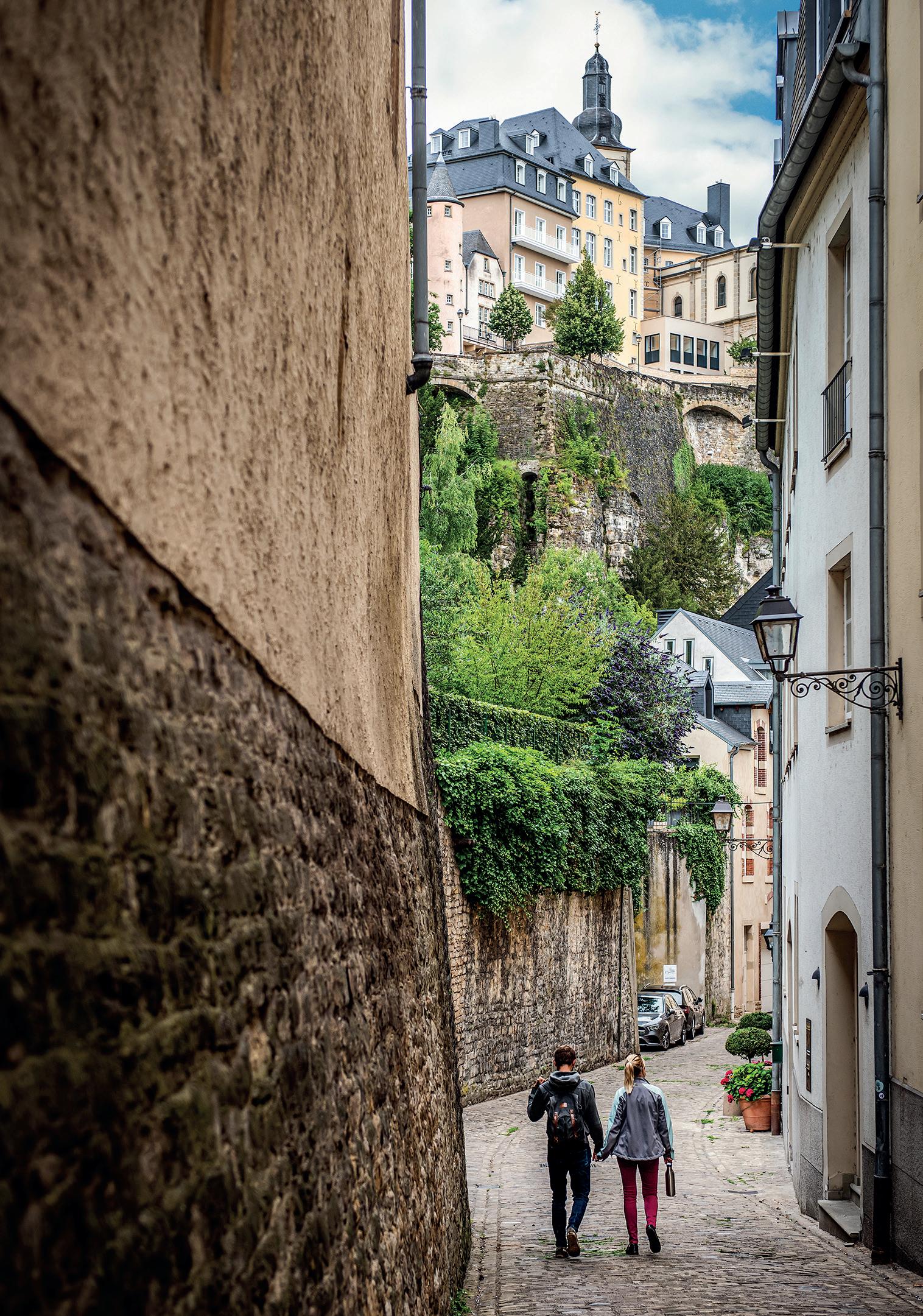
In the latest episode of our podcast, we’re heading to Orlando, a city in the centre of Florida that needs little introduction.

Known as The Theme Park Capital of the World, Orlando is home to seven of the world’s top theme parks and visitors come from around the globe to experience all the fun it offers.

Yet beyond the rides there’s a city bursting with culture, wildlife, good food and authentic American experiences, which is proud to welcome everyone to enjoy them. Tune in to learn more, as we chat with two knowledgeable and passionate locals.
In this episode of our podcast, we’re travelling to Jersey, the curiously Brit-ish… island in the English Channel. It’s a place that’s familiar but with a delightfully continental twist, and it’s somewhere you’ll quickly and easily feel on holiday.
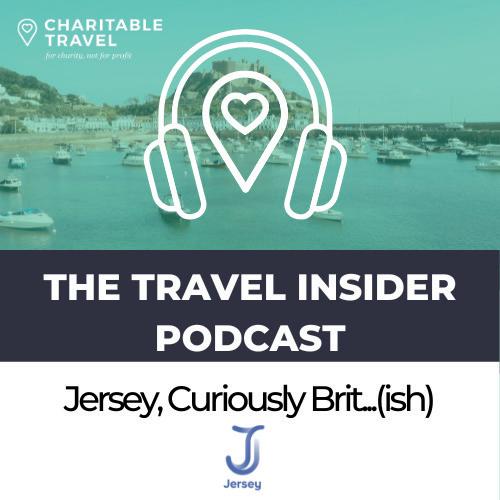

The largest of the Channel Islands, Jersey is the sunniest spot in the British Isles and is just a short flight or ferry ride away from the UK mainland. Once on the island, you’re never more than 10 minutes from the beach.
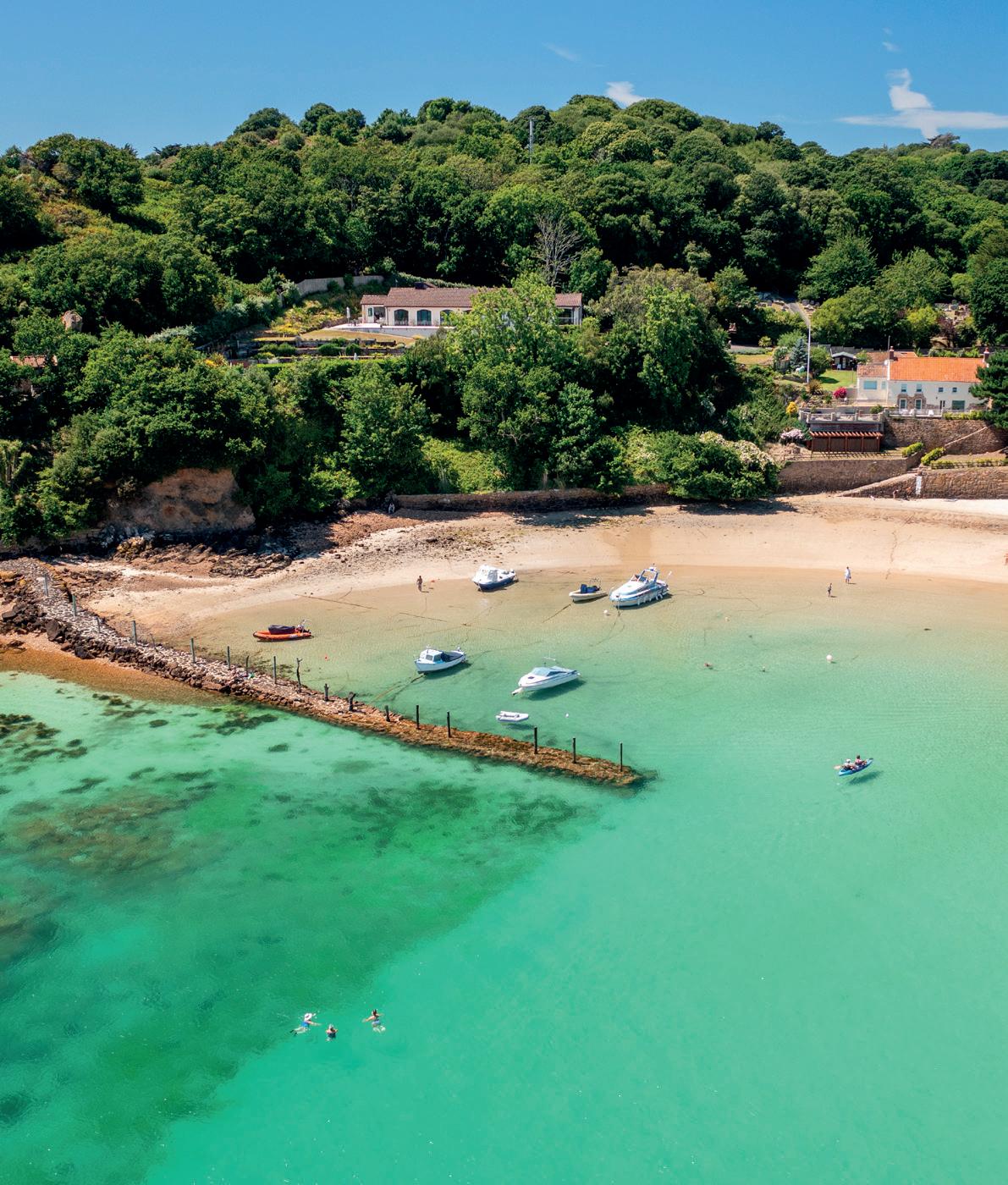
The capital of St Helier is a bustling harbour town, the island’s history and culture reveal their secrets at every turn, and the fresh local produce is worth the visit alone.
Tigers4Ever aims to protect wild tigers from extinction by eliminating the threats posed by poaching, poisoning and retaliatory attacks. The charity was founded in 2010 and works with the local communities to ensure they have a vested interest in wild tiger survival
29 July 2023


is the 13th Global Tiger Day, otherwise known as International Tiger Day


Saving wild tigers also protects the forest homes of many other endangered species, including pangolins, barasingha deer and elephants
Since 1940 wild tigers have lost more than 93% of their historical habitat
In 1940 there were 100,000 wild tigers globally
Anti-poaching patrollers have been supplied with 200 first aid kits, 105 mosquito nets, 234 waterproof head torches and 51 powerful flashlights
720 anti-poaching patrollers who protect wild tigers have been given waterproof clothing and boots
309 have been provided with warm winter jackets, thick socks and warm boots

66 families impacted by human-wildlife conflict have been given bereavement support and emergency aid Wild tiger and bush meat poaching is at a 10-year high so keeping Tigers4Ever’s antipoaching patrols in the forest is now more important than ever

Now, there are around 4,500 with more than two thirds of these in India



3,135 education packs have been supplied to children in 32 villages living with wild tigers
19 wild locations now have permanent water supplies (via solarpowered pump systems) – these provide yearround water for more than 90 wild tigers and their prey

In 2010 there were 1,706 wild tigers in India. By the end of 2022, that number had increased to 3,167
Since 2010, Tigers4Ever has reduced wild tiger deaths due to poaching and retaliatory poisoning by 98% in Bandhavgarh National Park
Book a holiday with a difference with Charitable Travel


Whether you’re longing for a beach break to build amazing memories with your family, a romantic escape with your loved one, or want to don your backpack and venture back into the great unknown, our team of travel experts can help you plan and book the holiday you deserve.

Plus, when you book with Charitable Travel you can donate 5% of your holiday cost to a charity of your choice… completely free!

